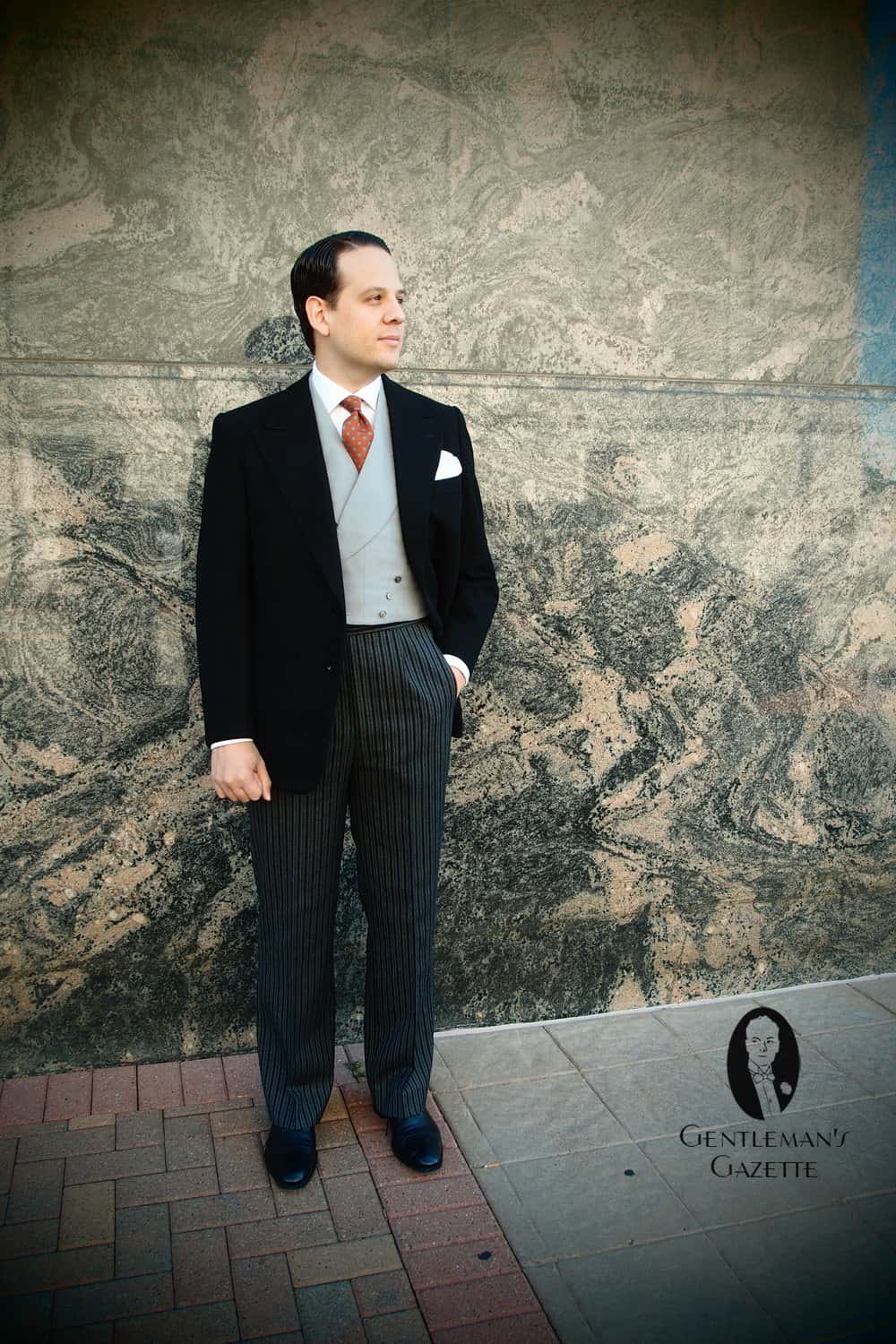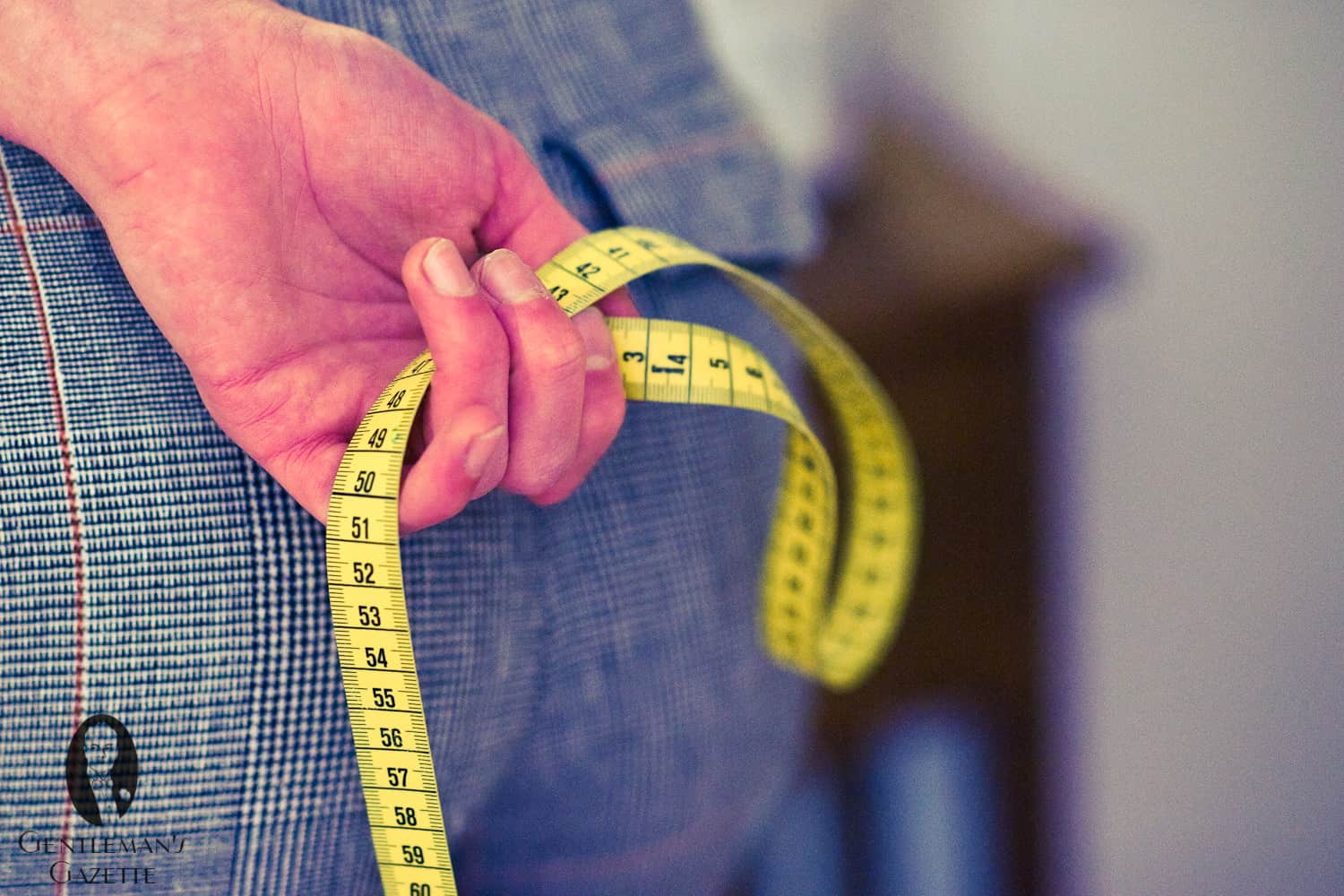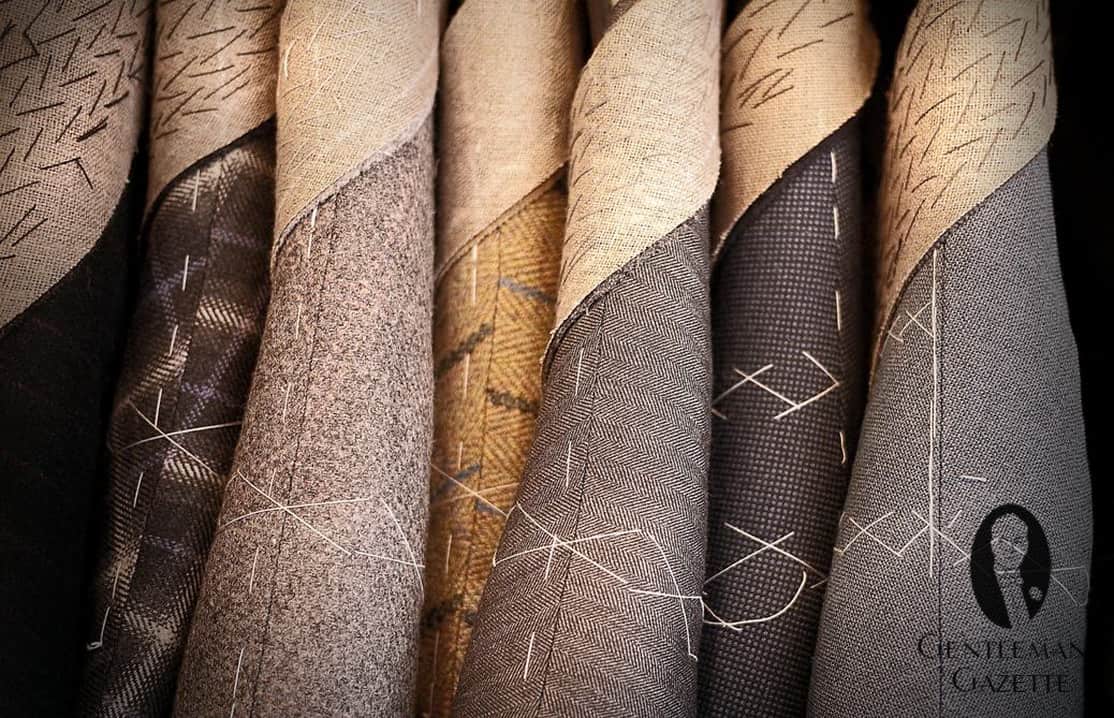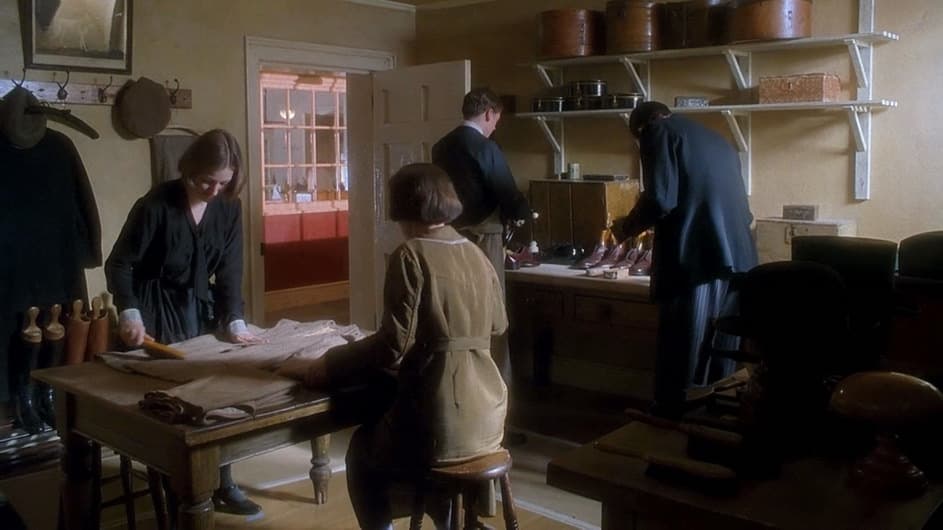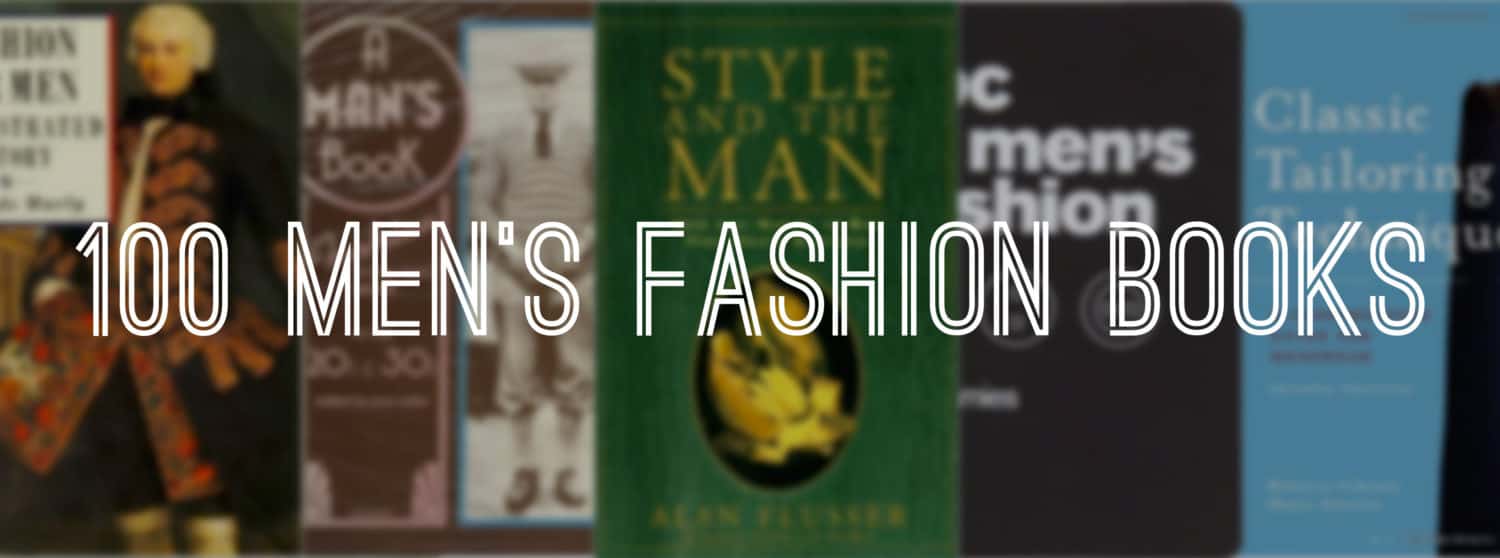We all have to deal with finite resources in one way or another, but here at the Gentlemans Gazette, we believe you shouldnt have to compromise your style (too much) just because youre on a budget. In our guides, we always try to provide lists of quality manufacturers for various price groups but nevertheless these things are sometimes unaffordable, especially if you are still in school, if you are at the beginning of your career or if your job simply doesnt pay that much. While good quality always has its price, the Gentlemans Gazette has always tried to cater to the man interested in classic style, no matter what is in your wallet.
Tips for Dressing Well on a Budget
So how do you dress the way you want to dress, when you dont have a lot of money? There are actually a number of advantages to building a wardrobe on a limited budget. It helps you prioritize what you really use and need, and if you take it seriously, youll develop some unique skills that will serve you well for years to come. For some men, you may even be happier with one great navy blazer versus the flush person who is never forced to consider what really works best for them.
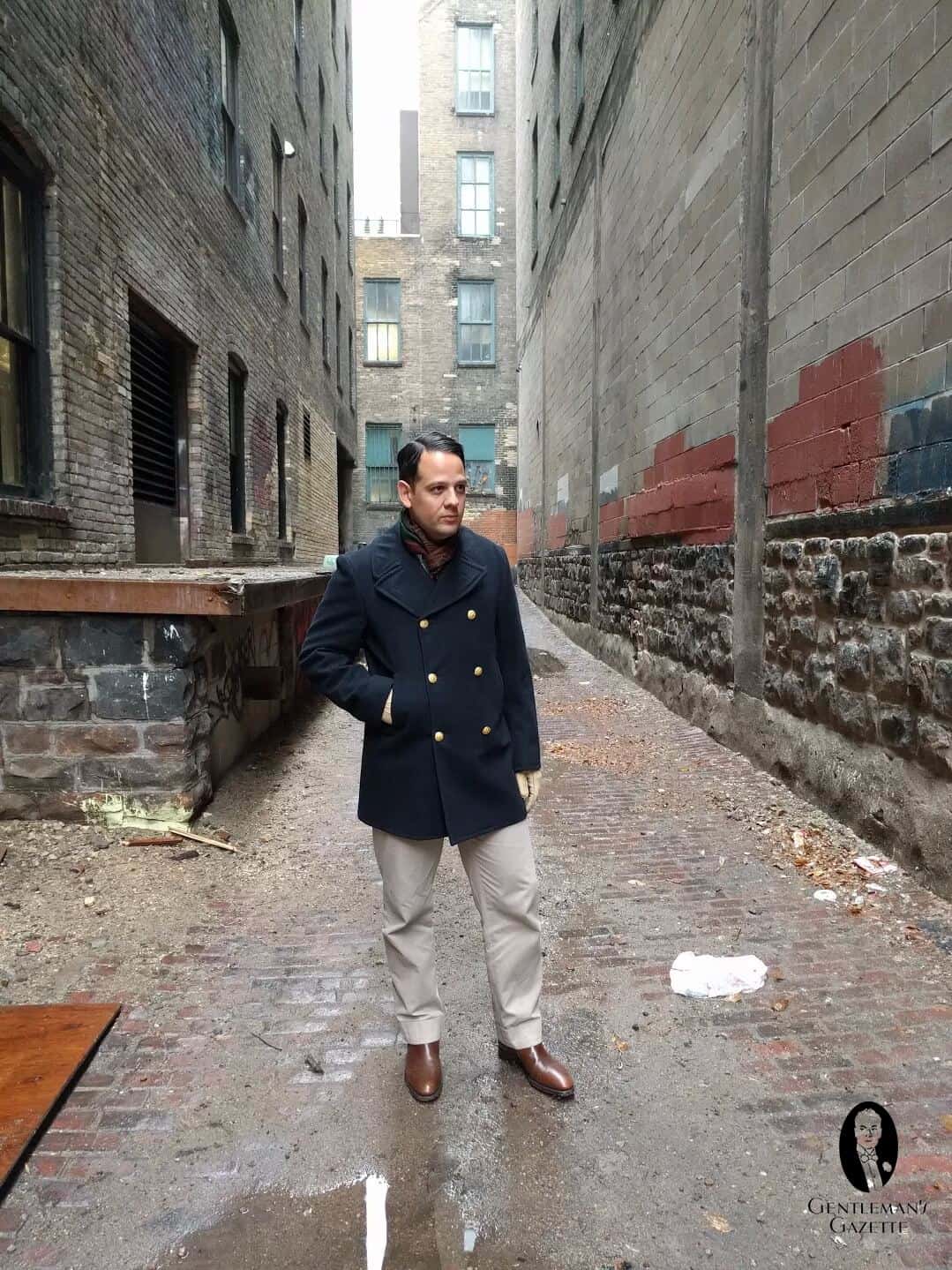
Peacoat with a double-sided scarf, Jodhpur boots, and Chinos Business Casual
In the following, we will share 15 tips that I personally used when I was money-poor but time-rich. By this, I mean that you can use your time to offset the lack of funds by, for example, scouring all your local vintage and secondhand stores for the perfect Navy-surplus peacoat. I still find that these tips are useful even when you have a bit more money because they help you create a good sartorial foundation based on finding the best value and identifying important things like proper fit and quality.

The Teenage Gentleman Ethan Wong has mastered the vintage look with a boater
Access & Affordability
For most men, the challenges of building the wardrobe they want come down to two things: access and affordability. You finances simply dont leave room for $1500 Brooks Brothers overcoats or you live somewhere that doesnt give you easy access to great clothes, vintage or otherwise.
Personally, I used to be a member of both camps.
I grew up in a small town in southern Germany with 3,000 people. At the age of 15, I began to read about classic mens style. I would meet with people and craftsmen, online and in person, and made sure to visit stores whenever I did have access. I researched my travel routes before so that I could meet people along the way.
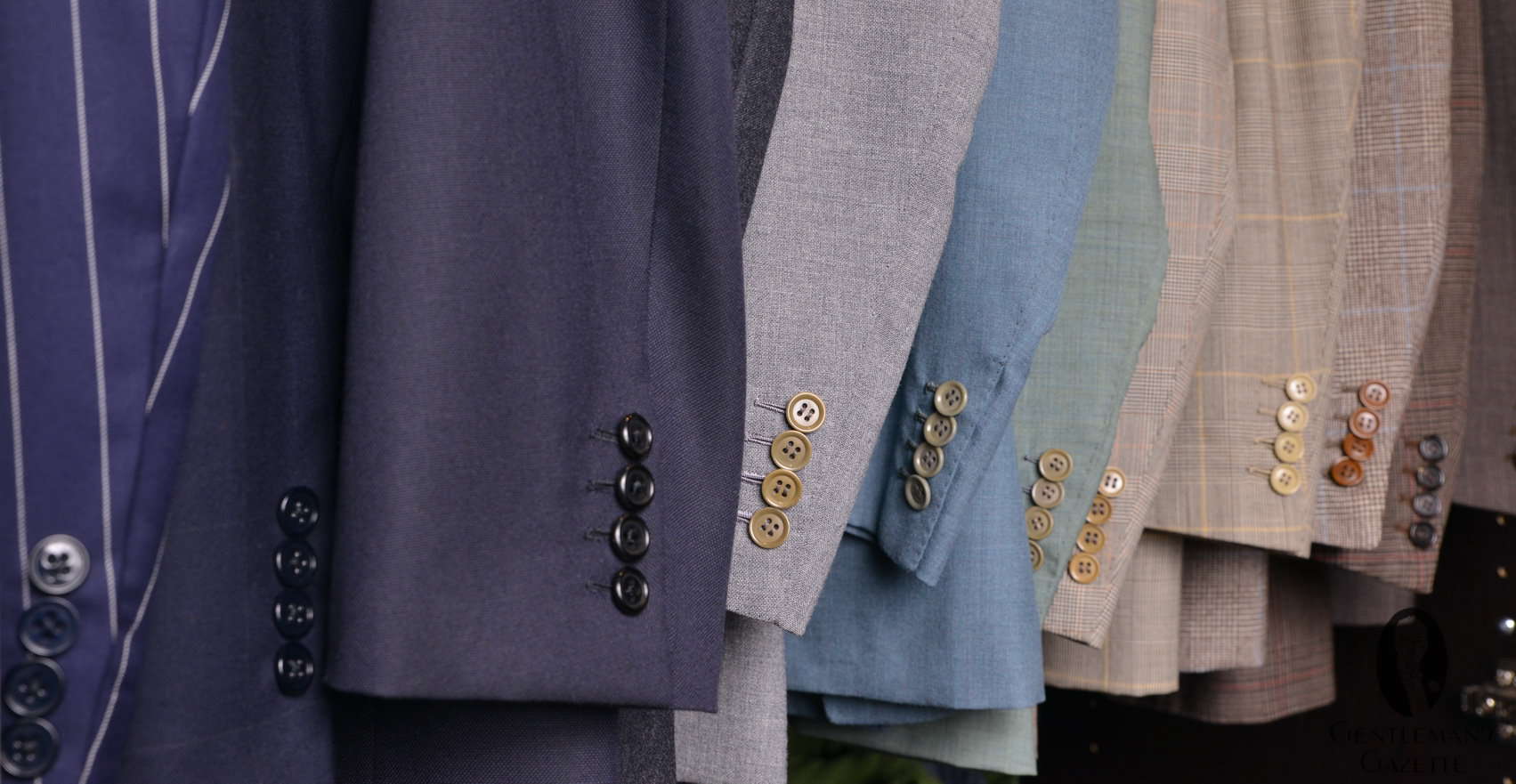
Sven Raphael Schneiders jacket collection, which is mostly vintage and secondhand
Later on, I moved to Munich and then Hamburg, where I went to law school. All of a sudden, I was living in cities with tailors, expensive haberdashers, and plenty of options to choose from, if it wasnt for the money. So I began by creating a list of items a complete wardrobe should have and started looking on eBay and most importantly, local vintage stores for items to add to my closet. If something didnt turn out, or if I found a better quality item along the way, I sold the old things and bought new ones.
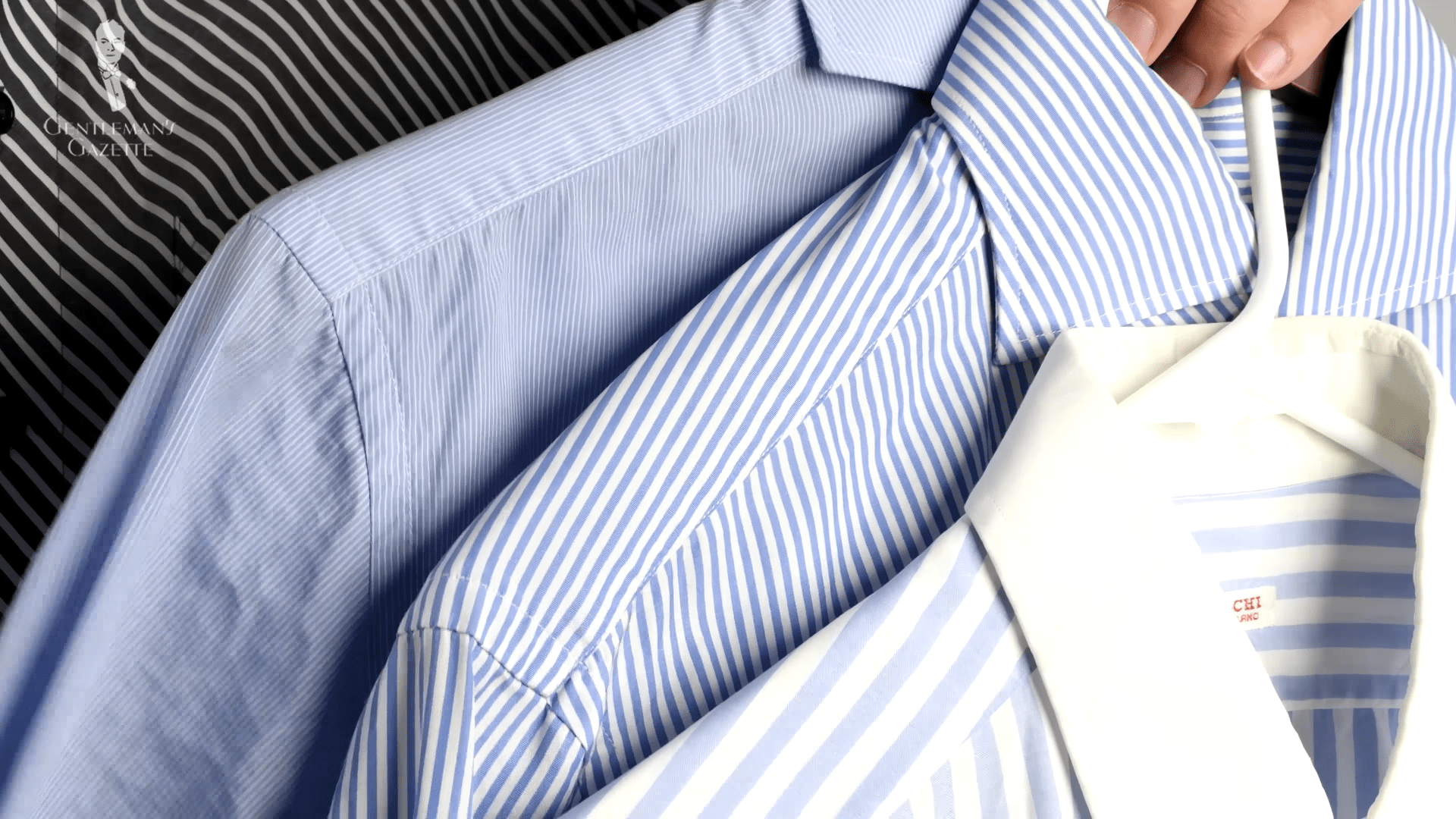
A few of Sven Raphaels blue dress shirts
My shirt wardrobe was completely revamped twice in this way, including the blue and white striped Siniscalchi bespoke shirt above that I picked up from a retiring businessman.
As you can see, I know exactly what it is like to have a limited budget or to live in an area without any availability. All of the hints and tips I provide here are based on my personal experience, and they worked very well for me. Furthermore, many of the things I bought years ago on eBay or at a vintage store still play an active role in my wardrobe today, like these tan derbies below that I bought as new-old-stock in 2003.
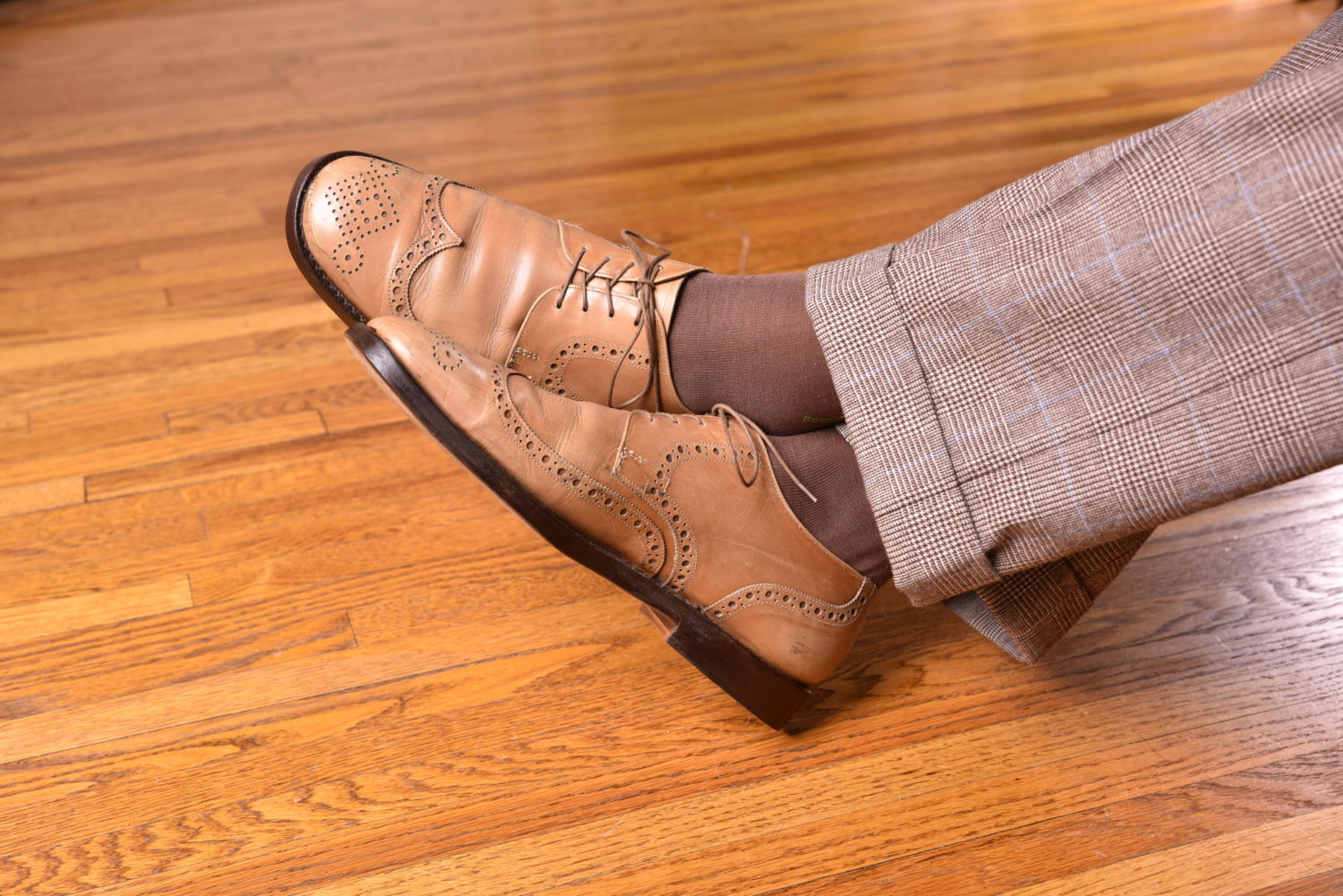
Tan derby shoes with Mid Brown Socks with Green and Cream Clocks by fort belvedere with glen plaid trousers
Tips for Men with Limited Budgets
Its hard to be surrounded by all these wonderful goods, but you just cant afford them at least new. Be consoled. You still have a big advantage to the ones who cant buy anything of quality even if they had the ability. Here are a few ideas to help get around the frustrating element of cost.
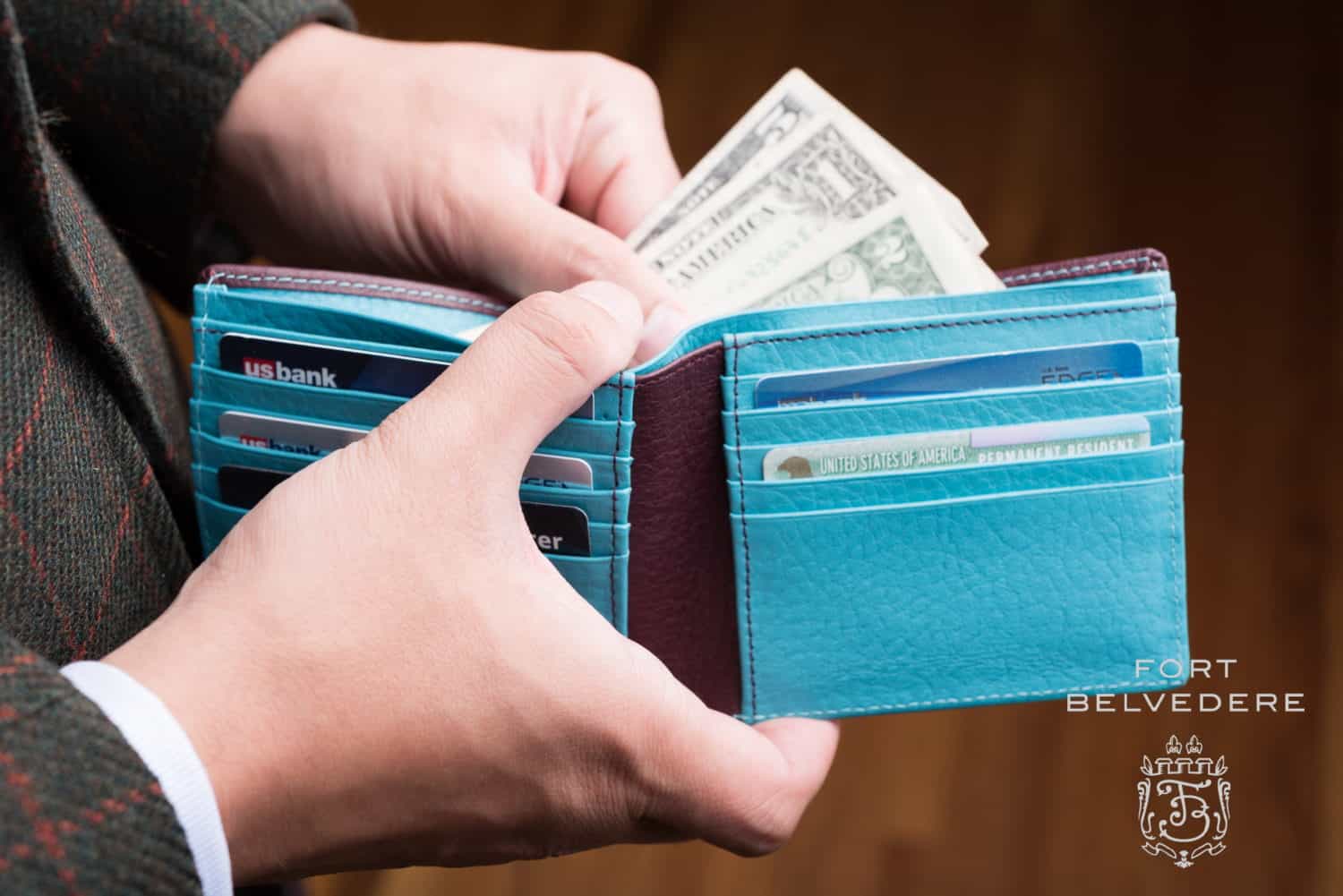
Budget Tip 1: Know Your Measurements
The fit is the most important thing when it comes to clothes. Since clothing sizing is highly variable and vintage clothes often have no tags to indicate size, measurements are the best way to understand if a certain garment will fit you.
That means you need to know your body measurements, plain and simple, and I dont mean your jeans size. Youd think that mens sizes would be reliable, but I am sure you know from your own experience that they are not consistent, and therefore they wont help you find better fitting clothing.Instead, you need to keep thorough and updated records of your measurements in both inches and centimeters. Have a friend or tailor assist you to get good measurements. Keep a spreadsheet, or better yet, memorize them.
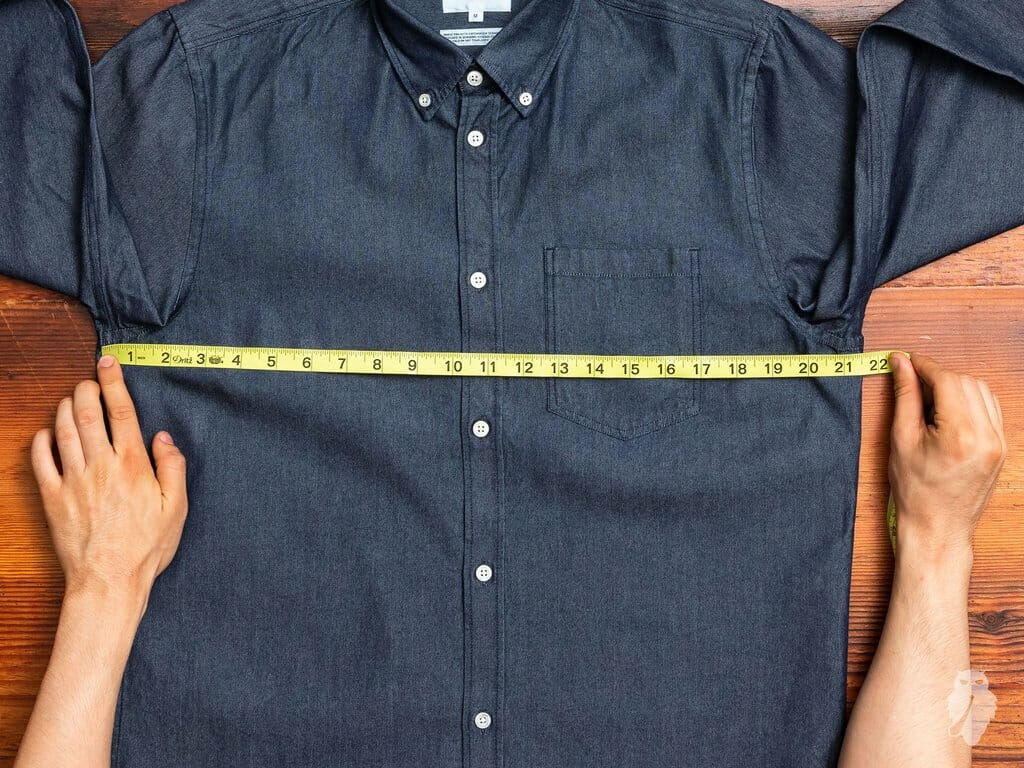
Vintage dealers often measure garments flat
Now take a look around eBay or Etsy for a clothing item you like. How are the measurements laid out? Many sellers are clueless as to how to measure clothing in a useful way, so youll need to learn to interpret the information they offer. For example, the may measure the chest laying flat, or the outseam rather than the inseam. You may need to measure something you already own that fits well to help guide you.
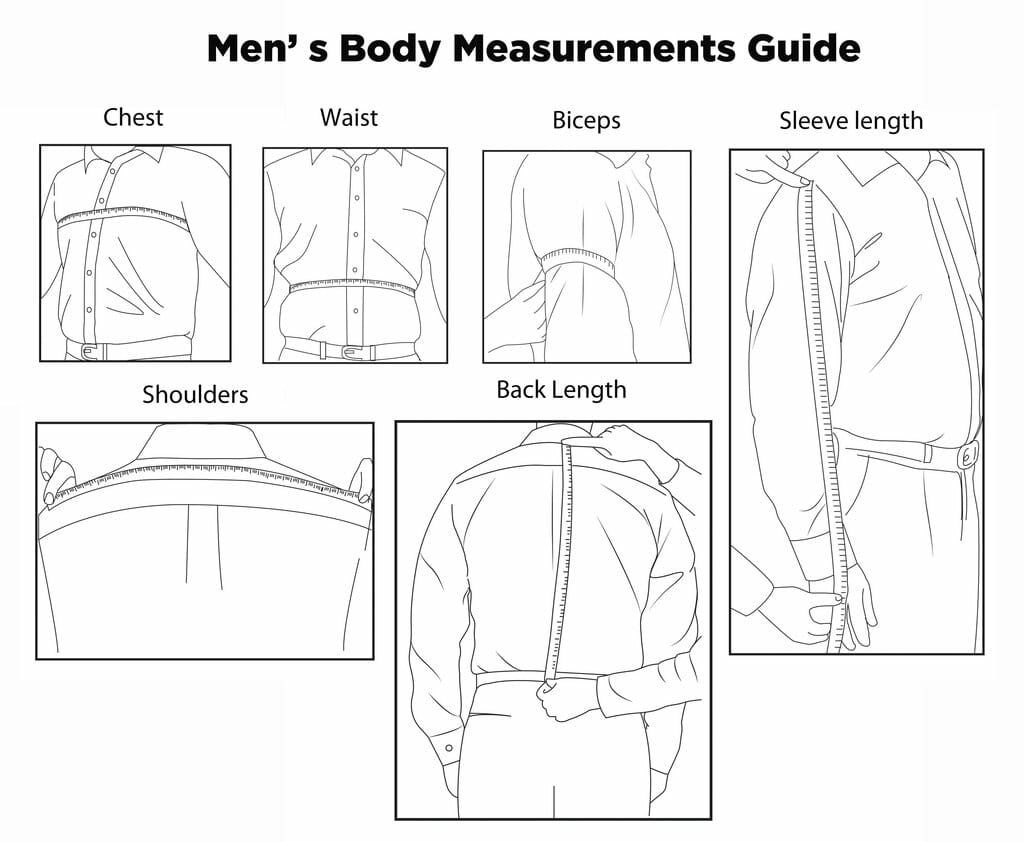
Mens measurement guide
The next step is to identify asymmetry. In the beginning, you may not notice the asymmetry of your body. But trust me, its there. On the other hand, it wont take a trained tailor very long to point them out once he sees you. If you want to figure out what your bodys characteristics are, purposefully wear a garment off the rack because it is symmetrical. Then, have someone take pictures of your body standing in a natural position from the front, back and both sides. This will help you learn your bodys quirks and needs, and how clothing needs to adapt.
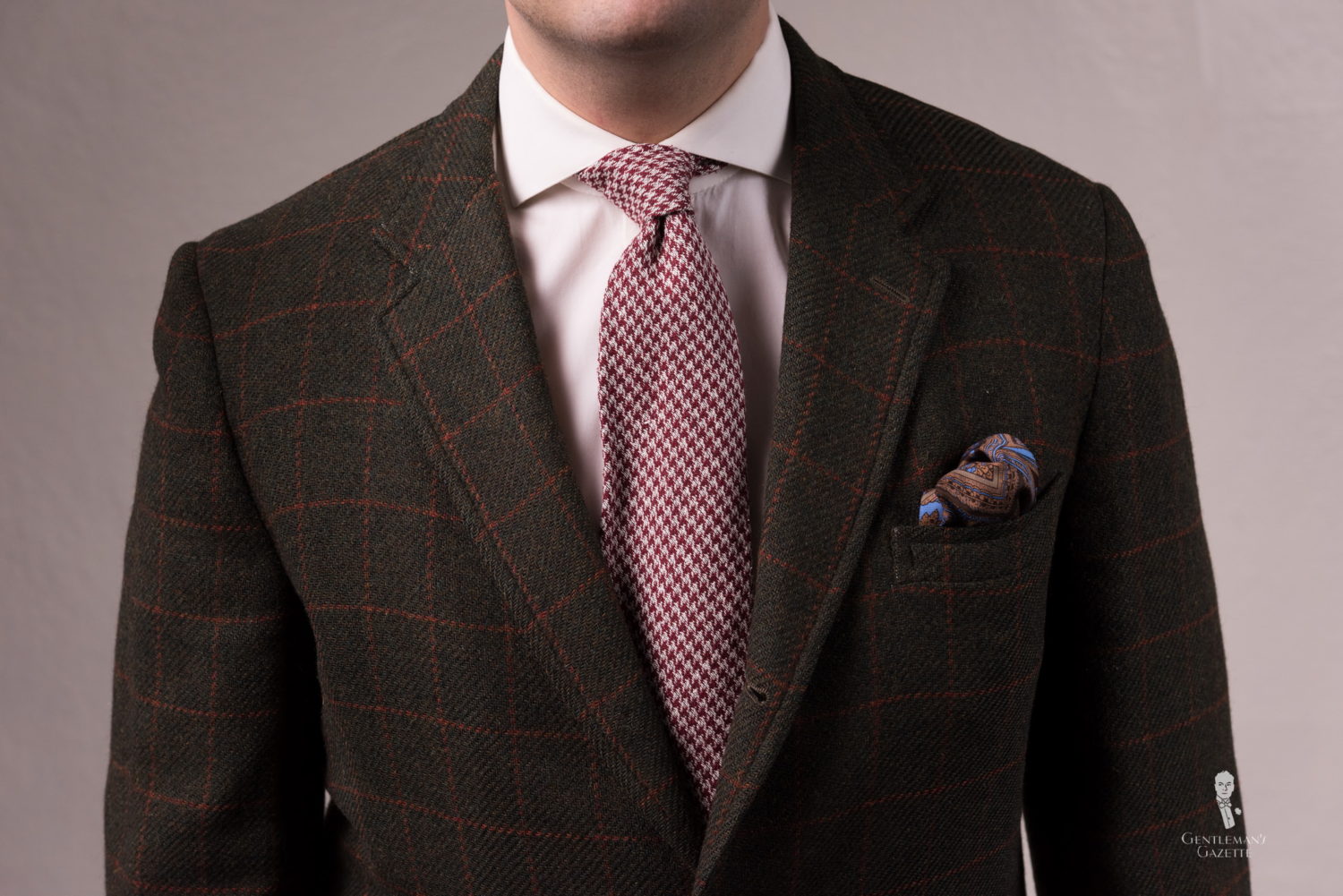
Oversized houndstooth tie
For example, my right shoulder hangs about 1.5 lower than my left one. This means my armhole has to be cut deeper, and I either need a shoulder pad on the right, or the cut of the shoulder has to be different. Moreover, the sleeve has to be set in differently. I have a slightly rounded back and one arm is half a centimeter (one-fifth of an inch) longer. My right leg is slightly bigger than my left one.
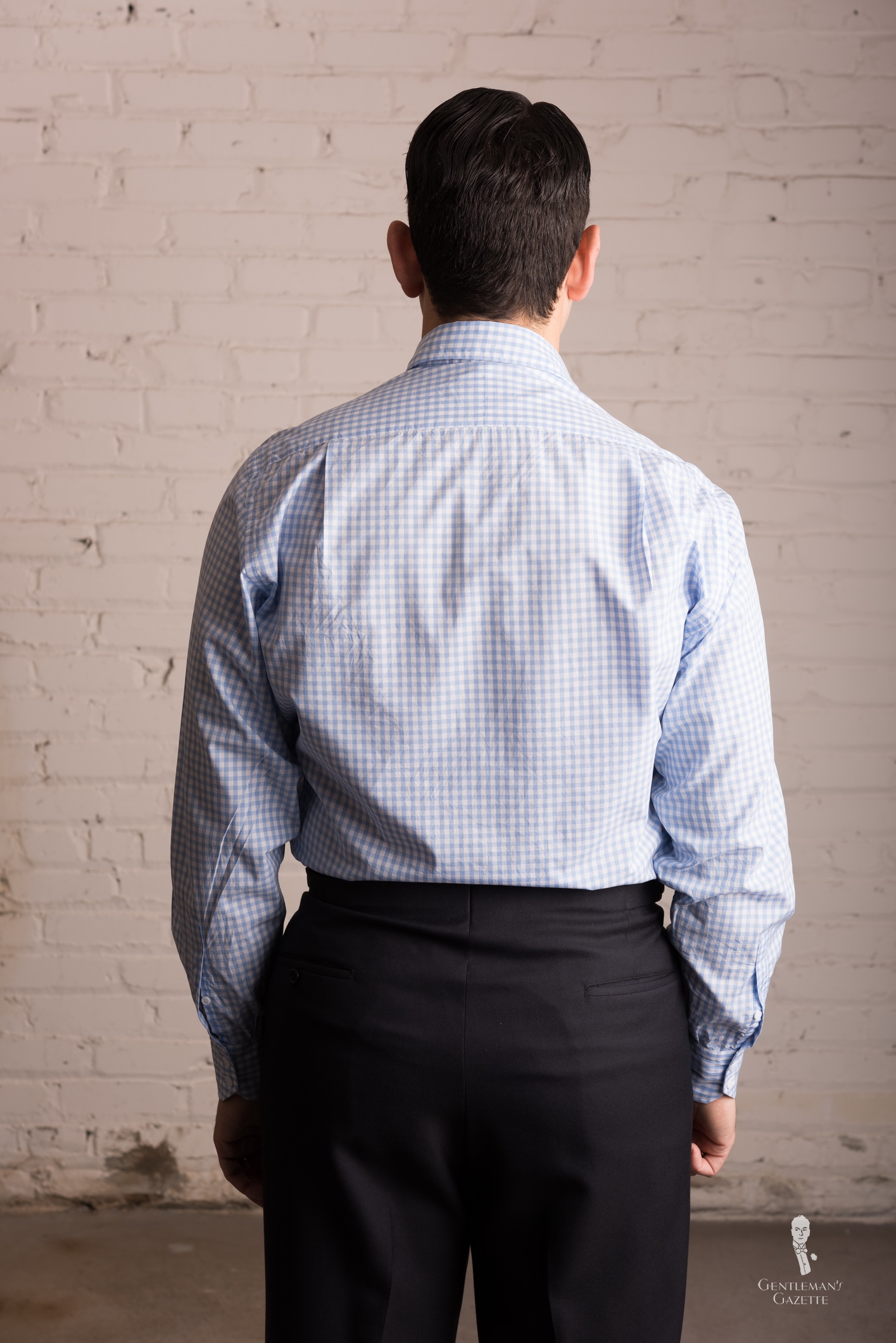
Back view with wrinkles due to sloping shoulder
Once you know your measurements, spotting well fitting (usually vintage or slightly used) clothing online will be much easier.

Summer suits in brown & pinstripes with spectators + odd jacket summer combination
Budget Tip 2: Know Your Needs
Every man who cares about dressing well should know exactly what is in his closet and what he needs to make it even better. Start by assessing your current wardrobe and identifying gaps for all seasons. Note pieces to replace, such as the navy blazer that never really fit you well.
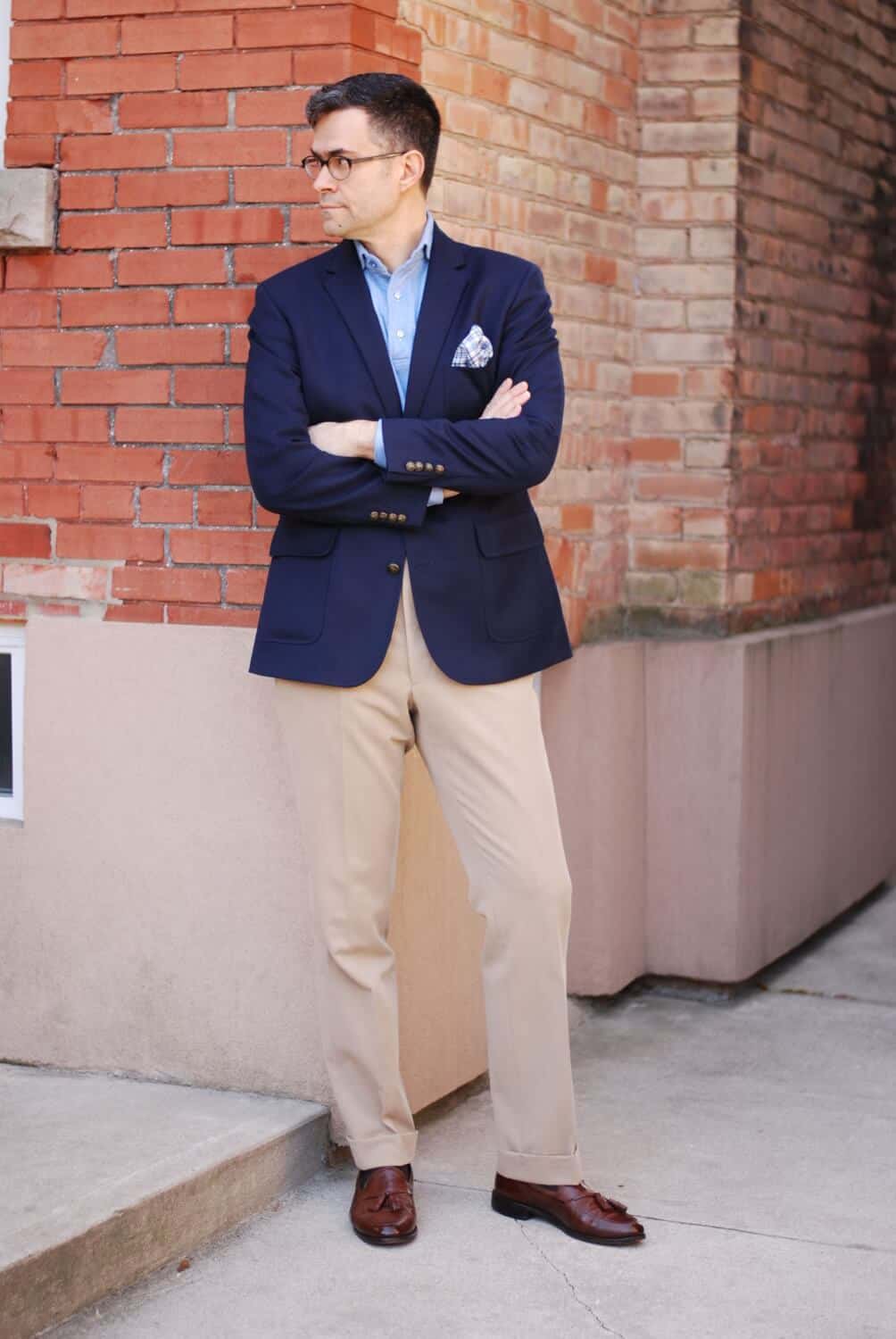
Business Casual Outfit Single Breasted Blazer with popover shirt, cotton pocket square, khakis and brown tassel loafers by hogtownrake
Take a minute and write down all the places you usually go to and what clothes you should be wearing ideally. Then, prioritize the gaps/replacements in terms of versatility and how much money you have to budget for each item. Prioritize the most versatile pieces, such as a navy suit, or wardrobe extending pieces first, since they will give you the greatest benefit for the dollar.
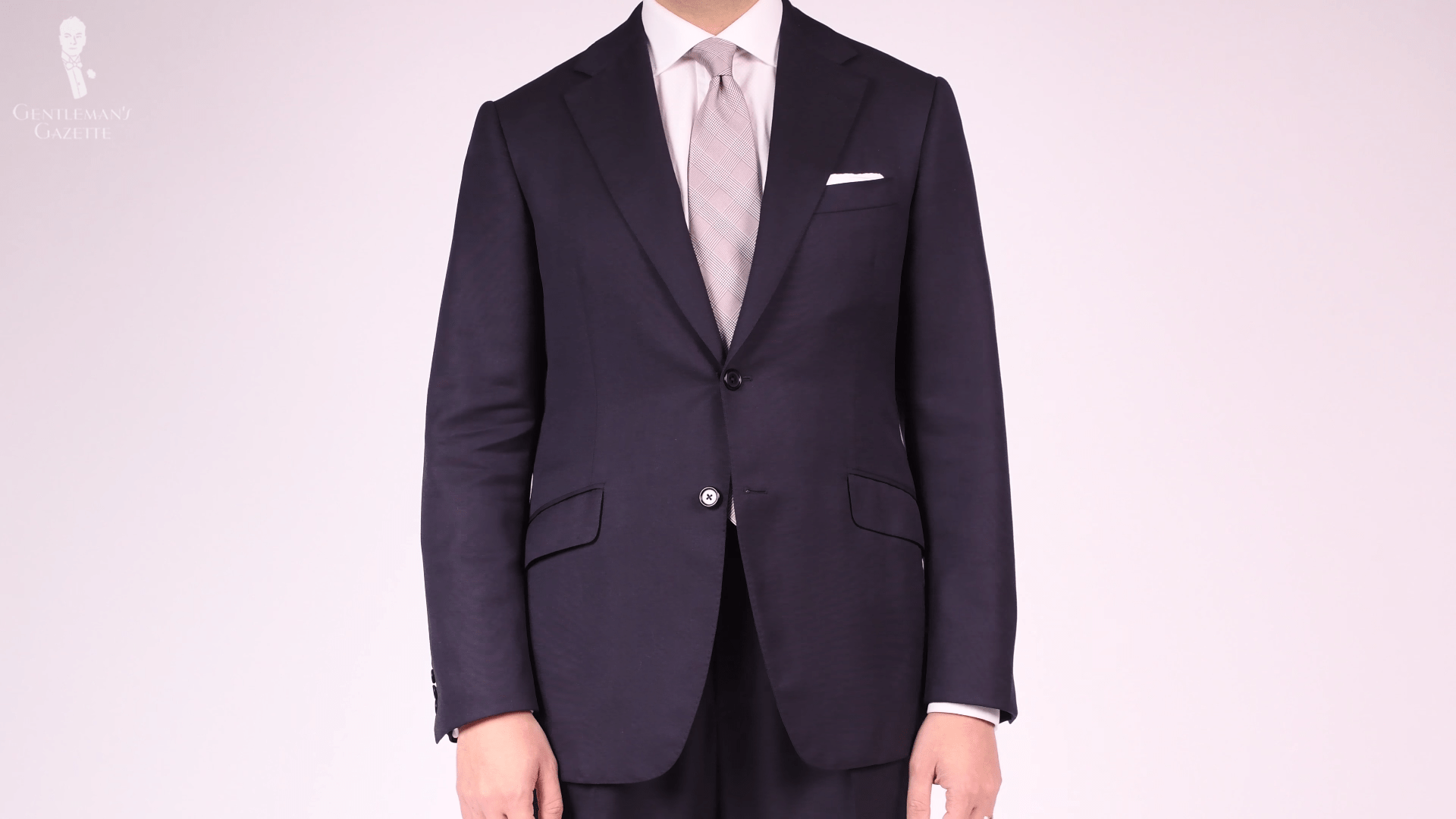
A simple single breasted navy suit accessorized conservatively with a Prince of Wales check tie and a white linen pocket square
When you are on a budget, its hard to stick to a rigid purchase schedule or you may miss key opportunities as they arise. But, if you already have a clear idea of what you need, you can make better decisions at the moment. Do your best to only buy what is on your list, and youll be happier with the result in the long run.
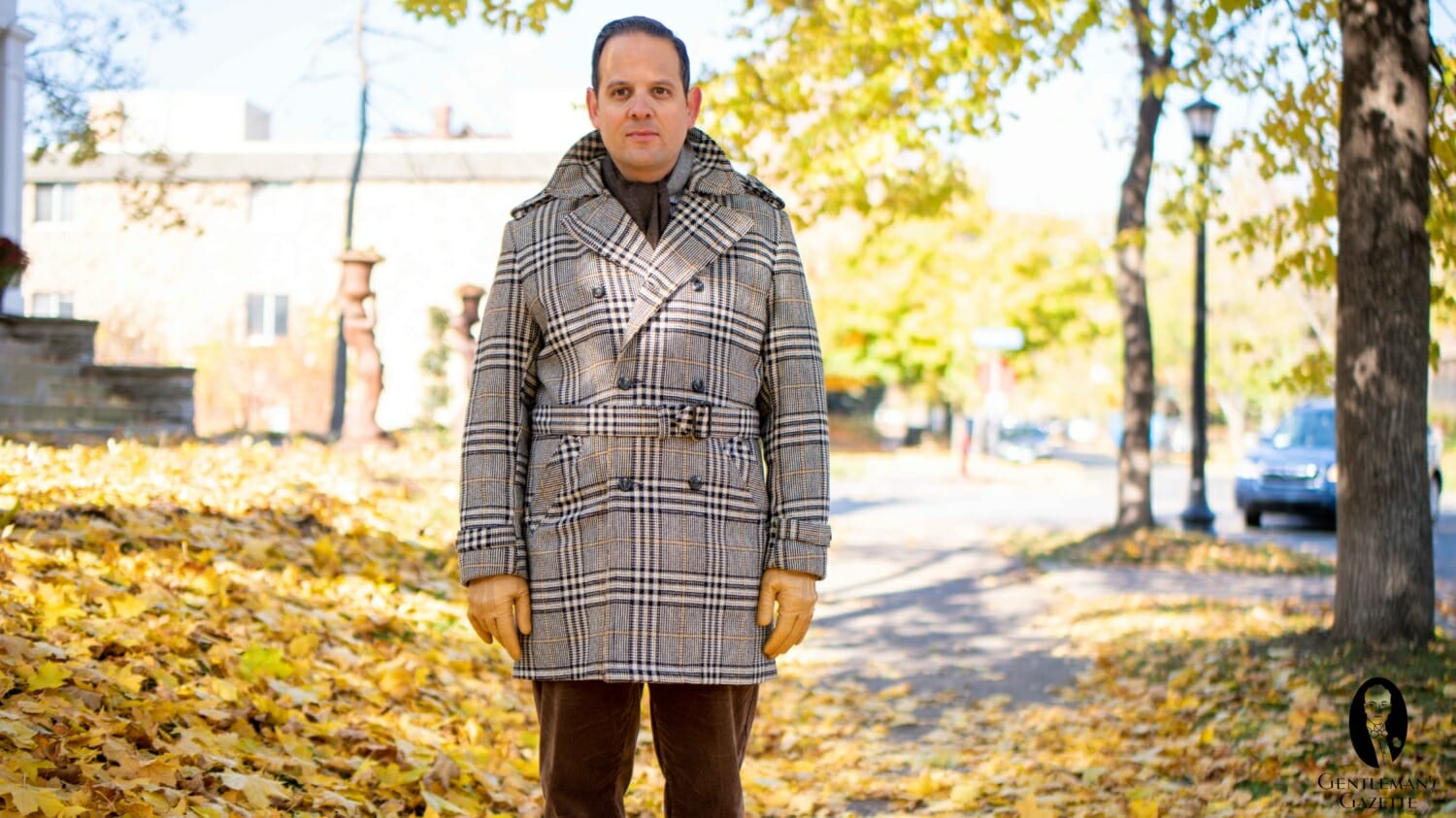
Sven Raphael Schneider wearing a vintage double-breasted check plaid overcoat with an Alpaca double-sided scarf and leather gloves
Mini-Tip: Once you have an idea of what is on your list, dont restrict yourself to shopping seasonally. Some of the best finds I made were of items on my list that were out of season. For example, I bought this overcoat for 5 euros in Dresden in July when it was 90 degrees out.
Budget Tip 3: Avoid Bespoke and MTM Garments in the Beginning
It may sound obvious, but the first tip I can offer you is to avoid bespoke and MTM suits, even if you find a really inexpensive tailor. Once youre into fashion, its only natural to want to add a nice suit, but its worth holding off for a while.
When I say bespoke, I mean true bespoke with fittings and a fair amount of handwork and canvas interlining. No matter where you make it in the world, you will hardly ever get a product for under $1,000 that is of the best quality (including cloth), and when you start and need an entire wardrobe, you will likely not be able to afford it.
Sometimes, salesmen and marketing campaigns try to offer you custom suits for $200 $500, but that is simply a made-to-measure suit. To fully understand the difference between Bespoke, Made-To-Measure, Ready-To-Wear and so on, please refer to this guide and video. Furthermore, you can do much better in terms of quality by looking for a secondhand or vintage suit.

Indochino MTM Jacket
To learn more about the new suit market and how limiting a low budget can be, you should understand the difference between a $100 vs. $1,000 Suit as well as a $500 vs. $5,000 Suit.
Budget Tip 4: Get to Know Your Alterations Tailor
Regardless of your body type, start looking for a skilled alterations tailor and learn what elements can and cannot be tailored successfully. Take a look at the work they offer and how they accommodate individual requests for difficult tasks, such as shortening a sleeve from the sleeve head. If they can do that properly, so the sleeves hang nicely without bumps on the sleeve head or wrinkles in the sleeves, chances are they can do everything else you need them to do.
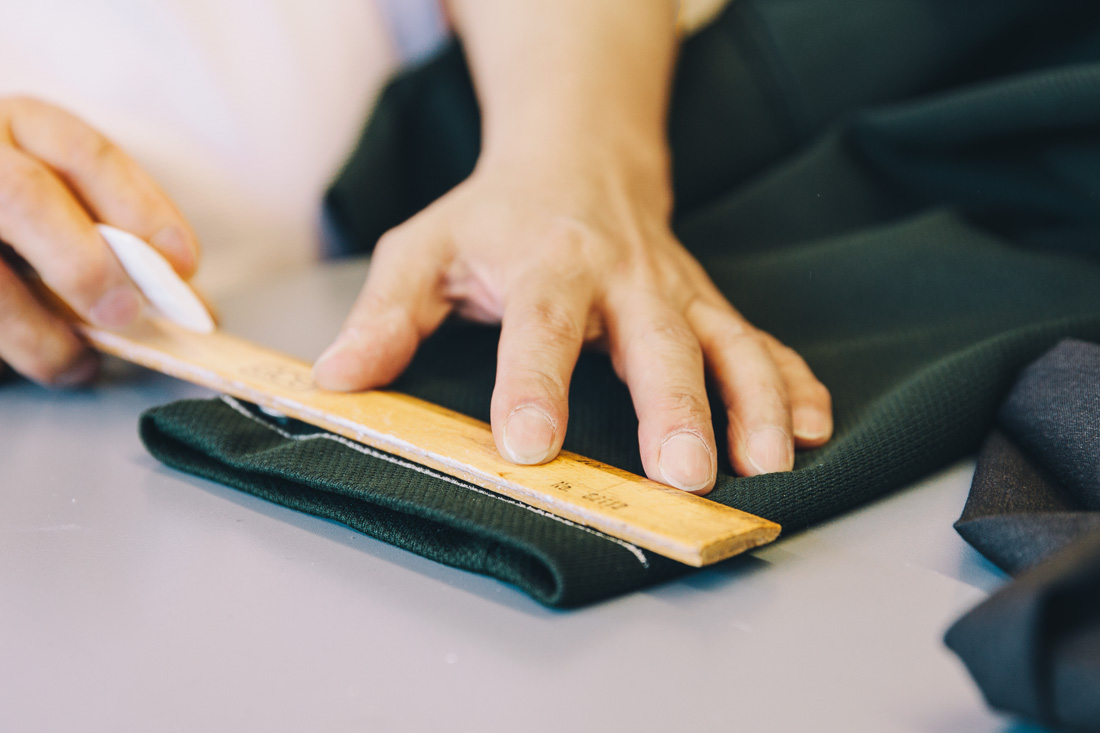
Alterations are key
However, even if you find the best alterations tailor, they are not magicians. As such, you cannot buy jackets that are too long or too short because even though there might be some fabric reserve, the buttonholes and the position of the pockets cant be changed. Also, if the shoulders dont fit, it is going to be difficult to fix it, just like the front-back balance.
Bad fit can ruin your appearance; would you want to be seen wearing this ill-fitting Mens Wearhouse rental tux?As a rule of thumb, do not buy anything that is more than one size to small or too large because alterations will be costly and the result is often not ideal. Also, when in doubt, buy something that is slightly too big rather than too tight, because removing fabric is easy but if there is not enough cloth reserve in the garment, you cant wear the garment.
Budget Tip 5: Go Vintage
In the beginning, my wardrobe was 90% vintage, secondhand, or new-old-stock. Im still proud of how well I managed to dress even though I rarely set foot in nice stores.
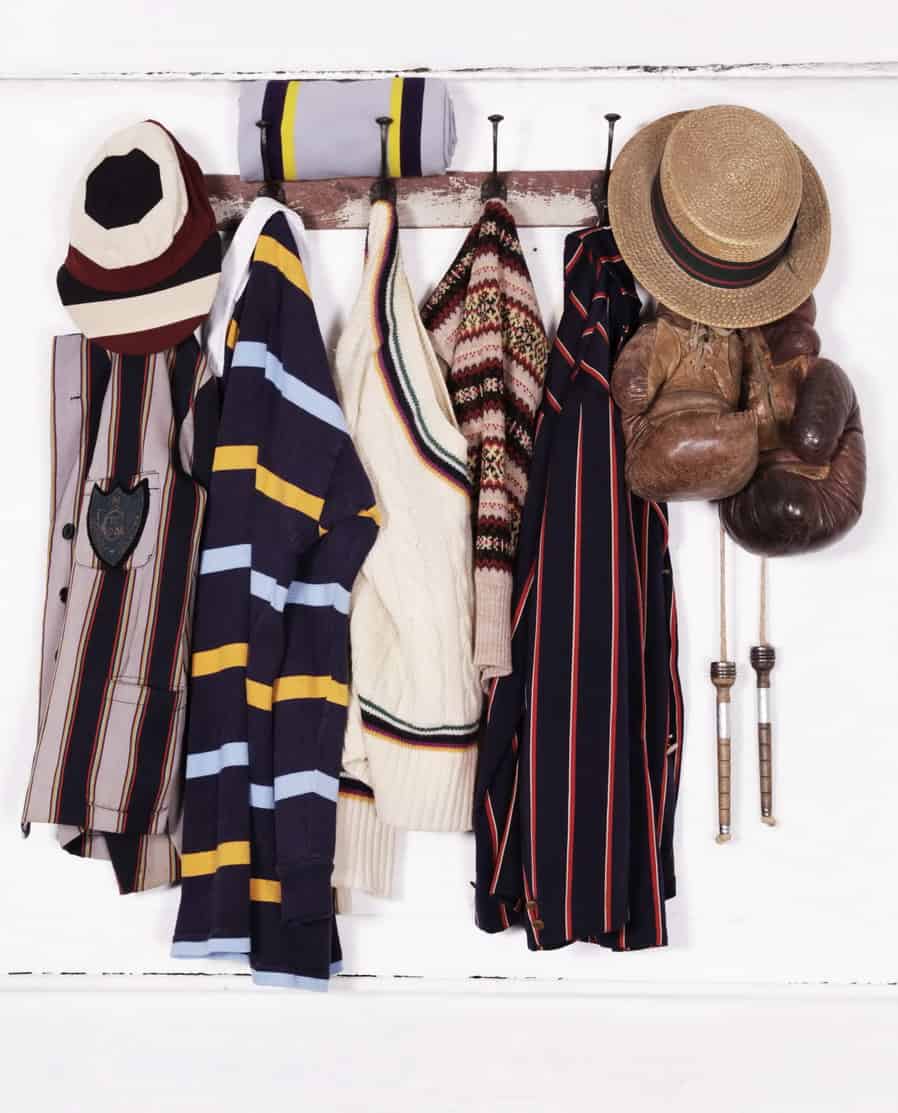
Vintage Tennis Sweater, Boater Hat & Blazers
Vintage stores or flea markets in larger cities like London or Naples often provide quality clothing at a fraction of the retail price, but Ive found vintage buys worth owning in just about every place Ive traveled. Of course, it usually takes a bit of time to find something good, but if you do and the fit is ok, your alterations tailor can do the rest.
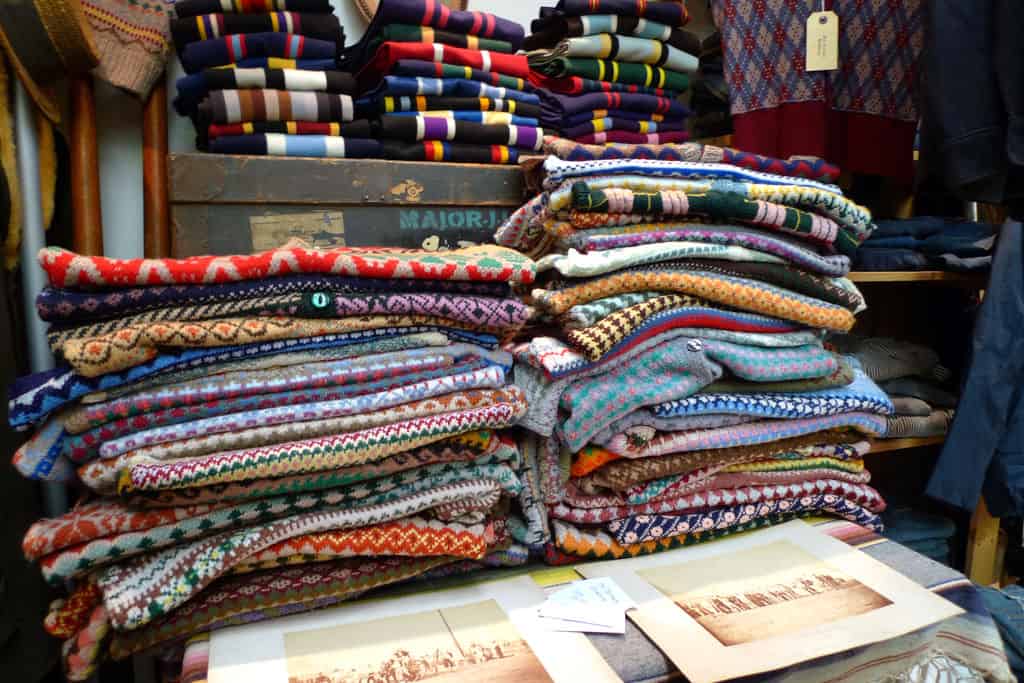
Sweaters at the Vintage Showroom by Tweedland Gentlemans Club
Vintage shopping requires patience, knowledge, and practice to do well. You need to know what you are looking for, what quality construction and materials feel like, and a solid understanding of brands and countries of origin. To be an effective vintage shopper, you should understand the following concepts:
- How to identify quality materials, like cashmere, cotton, and wool
- Brand names and what they are known for, such as Ralph Lauren or Brooks Brothers
- Countries of origin and what they are known for, such as Italian leather and tailoring
- Quality construction techniques, such as handmade buttonholes, hand-sewn sleeve lining, and hand-stitched collars
The more you know, the easier it will be to spot a quality product. For example, if you find a jacket with handmade buttonholes, chances are 99% you have a quality garment. In the beginning, it may be easier for you to identify a handmade buttonhole from the back side because it will look irregular whereas a machine-made buttonhole is consistent.
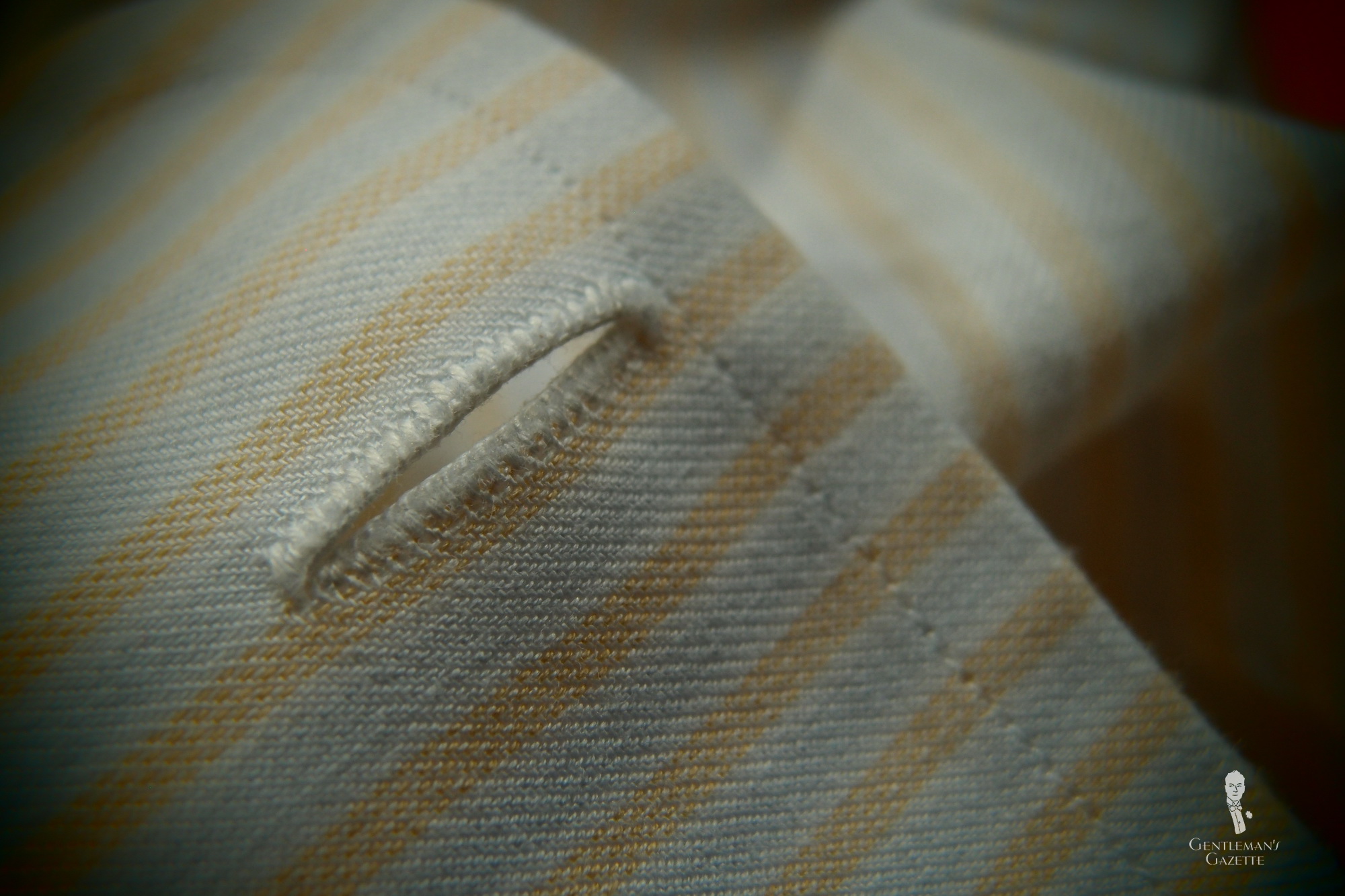
Quality fine handmade buttonhole
Ten years ago, it would have been enough to test if the jacket had working buttonholes, but today even a blazer from H&M for $50 has that feature, so it is not a quality hallmark anymore. That being said, there are also good garments with machine/made buttonholes. As a rule of thumb, if the hole is cut first, then neatly sewn, chances are it is a higher quality garment than if the stitch density is low and you can see some fraying.
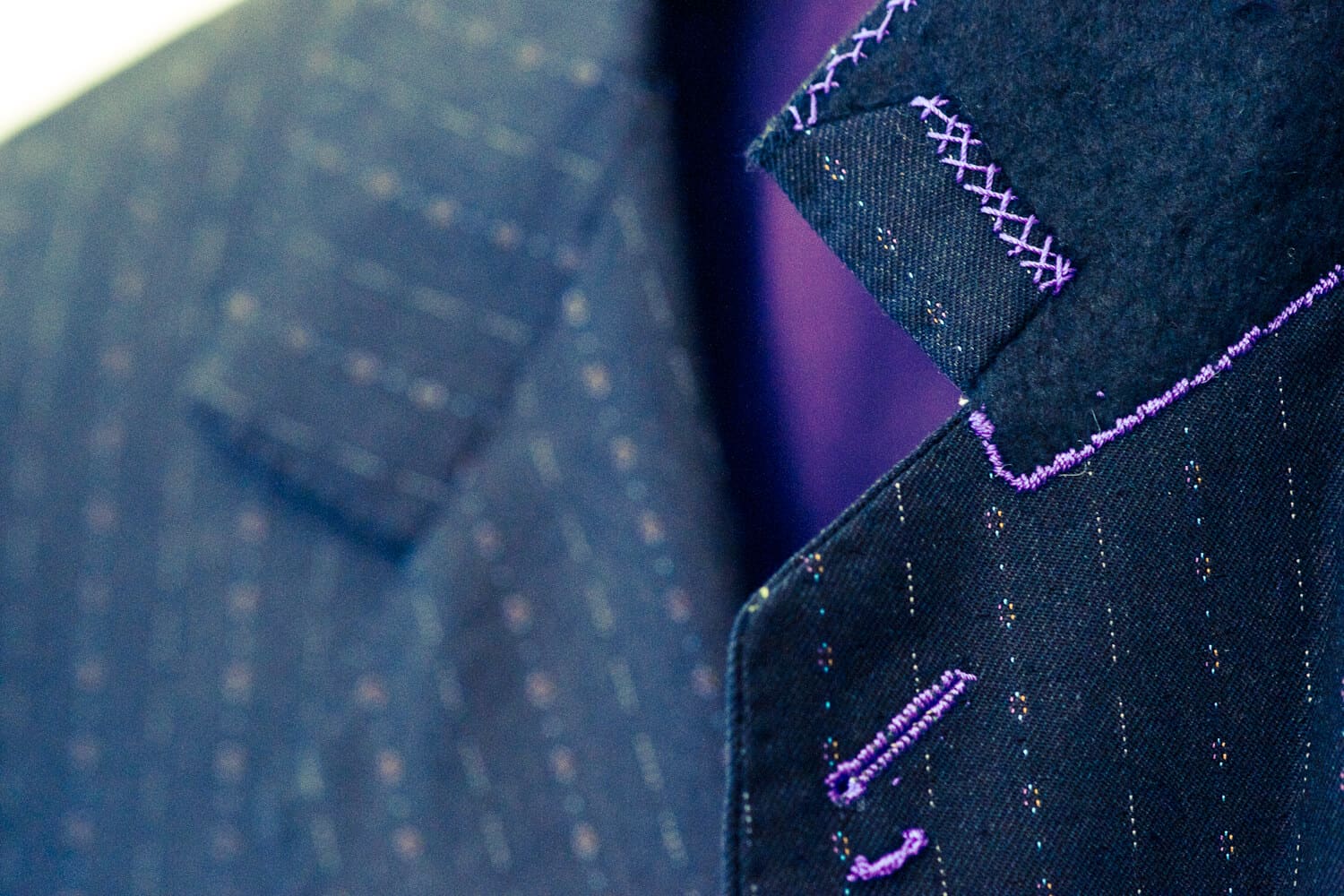
Finely hand-sewn collar with a boutonniere loop
Once you identify a buttonhole, you can quickly double-check if the sleeve lining is sewn in by hand. If thats the case, you likely have a quality garment and if you want to be sure, flap up the collar and look if it was attached with hand stitching. You can do all of this without having to take a jacket off the hanger. This allows you to quickly analyze an entire store for good garments.
Budget Tip 6: Invest in Flexible, Wardrobe Extending Pieces & Accessories
A bold pair of patterned pants may be a fun addition to your wardrobe, but their distinctiveness will not allow you to make many new outfits in the way a burgundy vest will.

Vests help to change the look of your existing wardrobe
Contrasting vests are less expensive than a jacket or a suit, and they really help you to create many new outfits with your existing wardrobe. Take a look at our odd vest guide for more details.
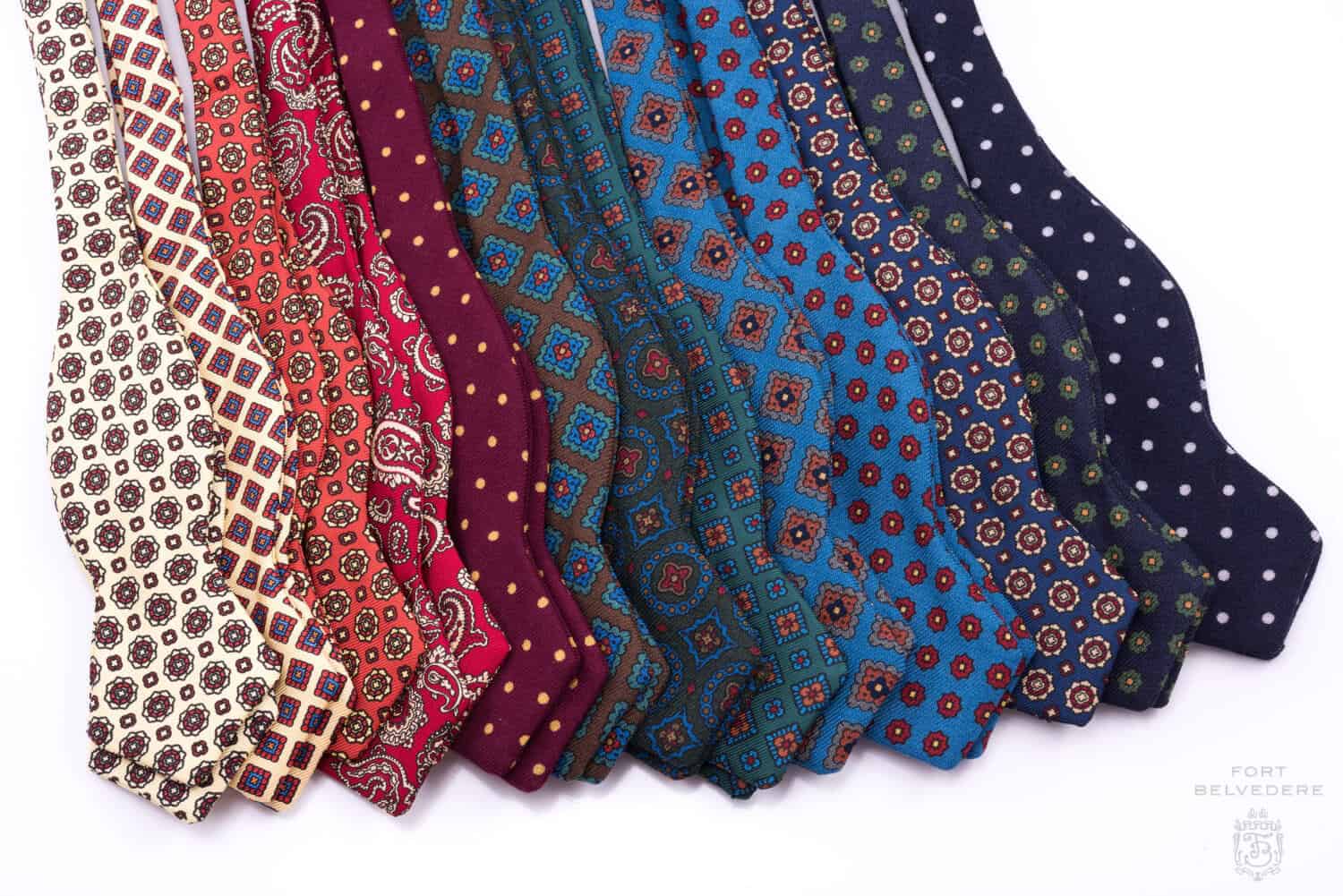
Assorted Pointed End Bowties Handmade by Fort Belvedere
Accessories will also help you more combinations out of your wardrobe than a new jacket or pants will.
Budget Tip 7: Take Care of Your Wardrobe
Proper care of the garments you already own will extend their life and it will be less expensive in the long run. However, caring for your clothes isnt always straightforward.
For suits, jackets, trousers, and overcoats that means you should brush them regularly with a clothes brush. Dry clean your clothes only when absolutely necessary because the harsh chemicals and technique used will drastically shorten the lifespan of your clothes.
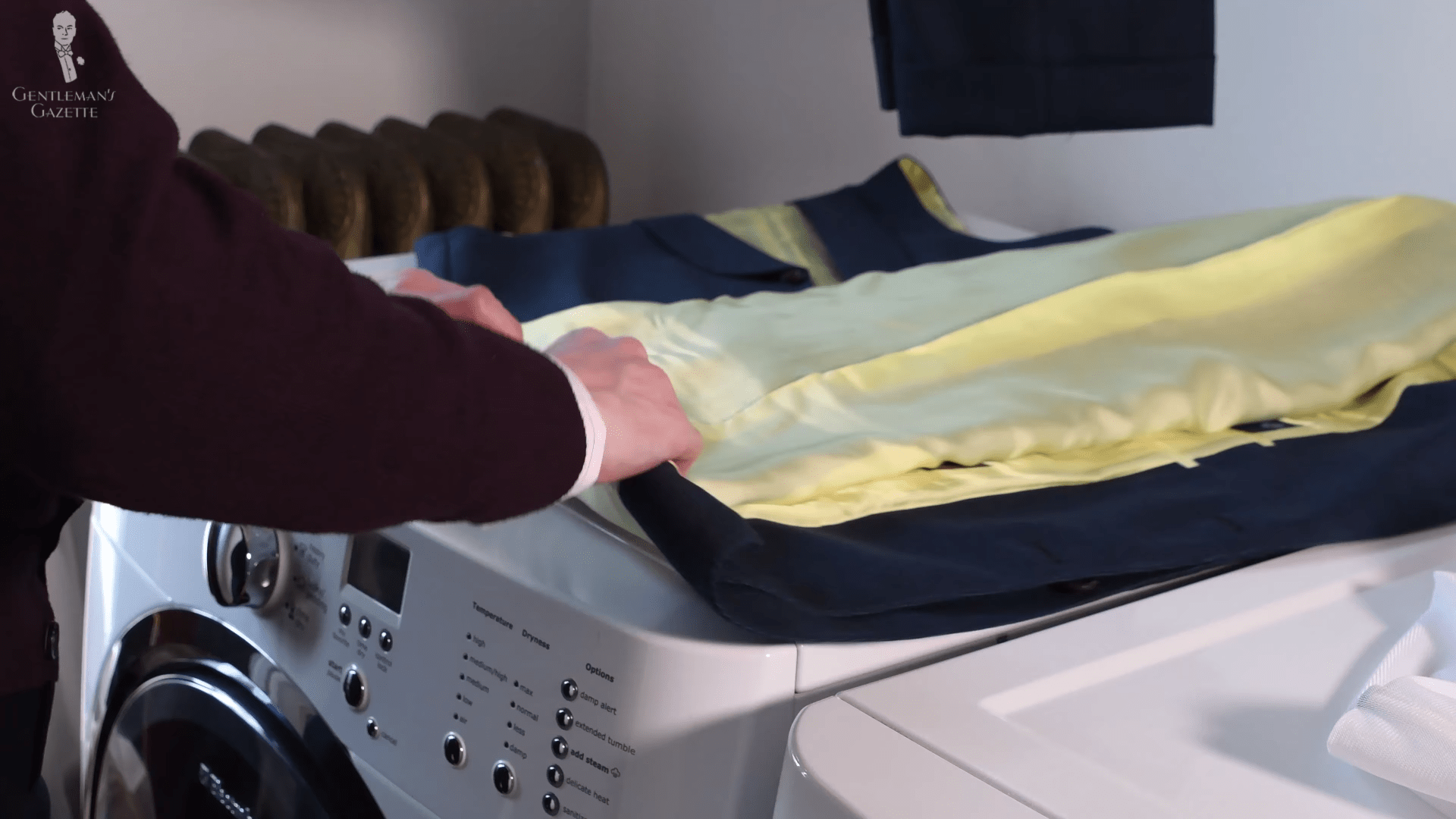
Preston Schlueter in the process of folding a suit jacket before washing
You can wash many suit jackets at home! Wash your sweaters carefully. If your garment is wrinkled, steam them either in a bathroom or with a steamer.
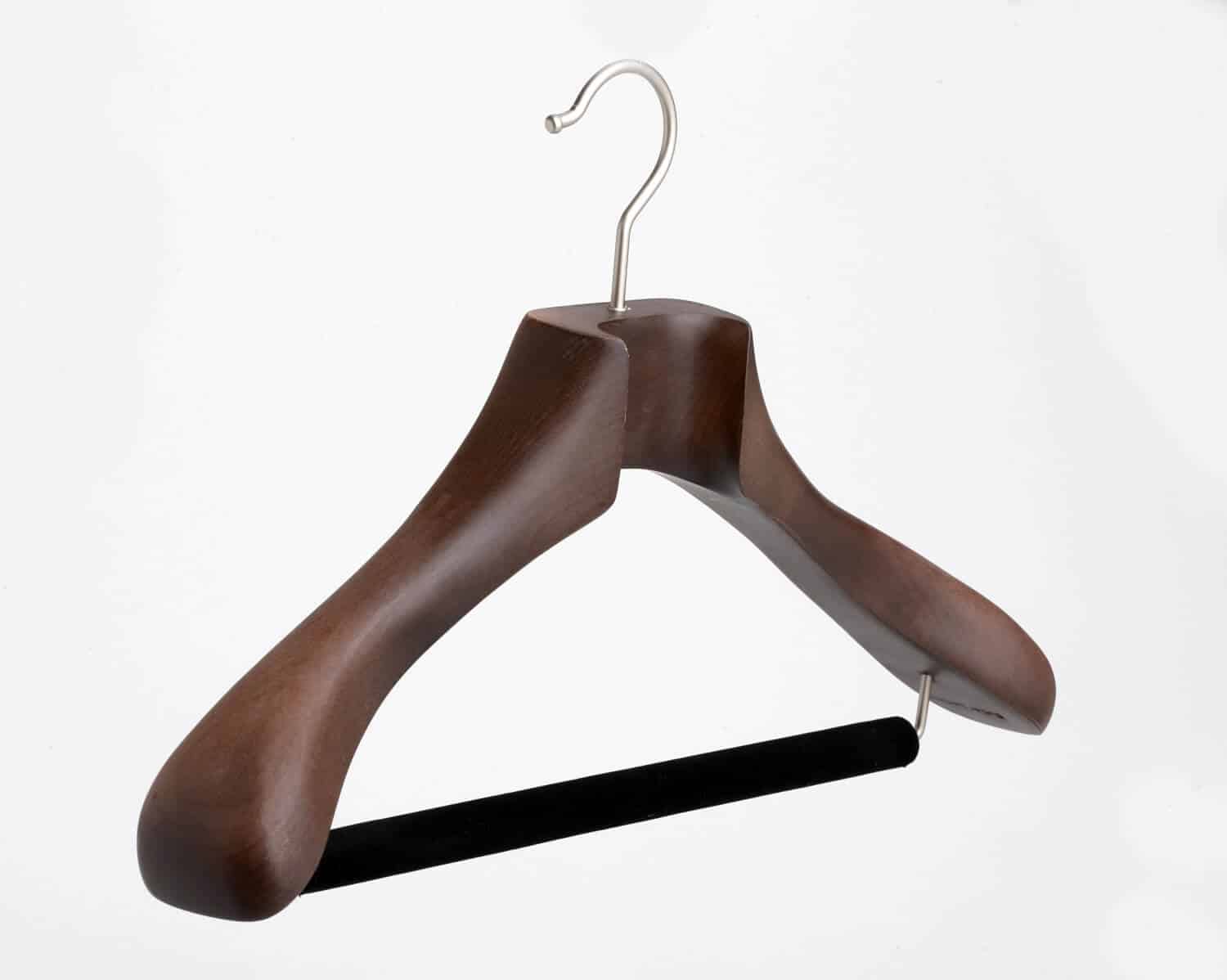
Butler Luxury Hangers
Hang your overcoats and jackets on wide hangers and if you cant afford Butler Luxury quality, go with plastic suit hangers. Shops often give them away for free.
Budget Tip 8: Beware that People Who Buy Cheap Buy Twice
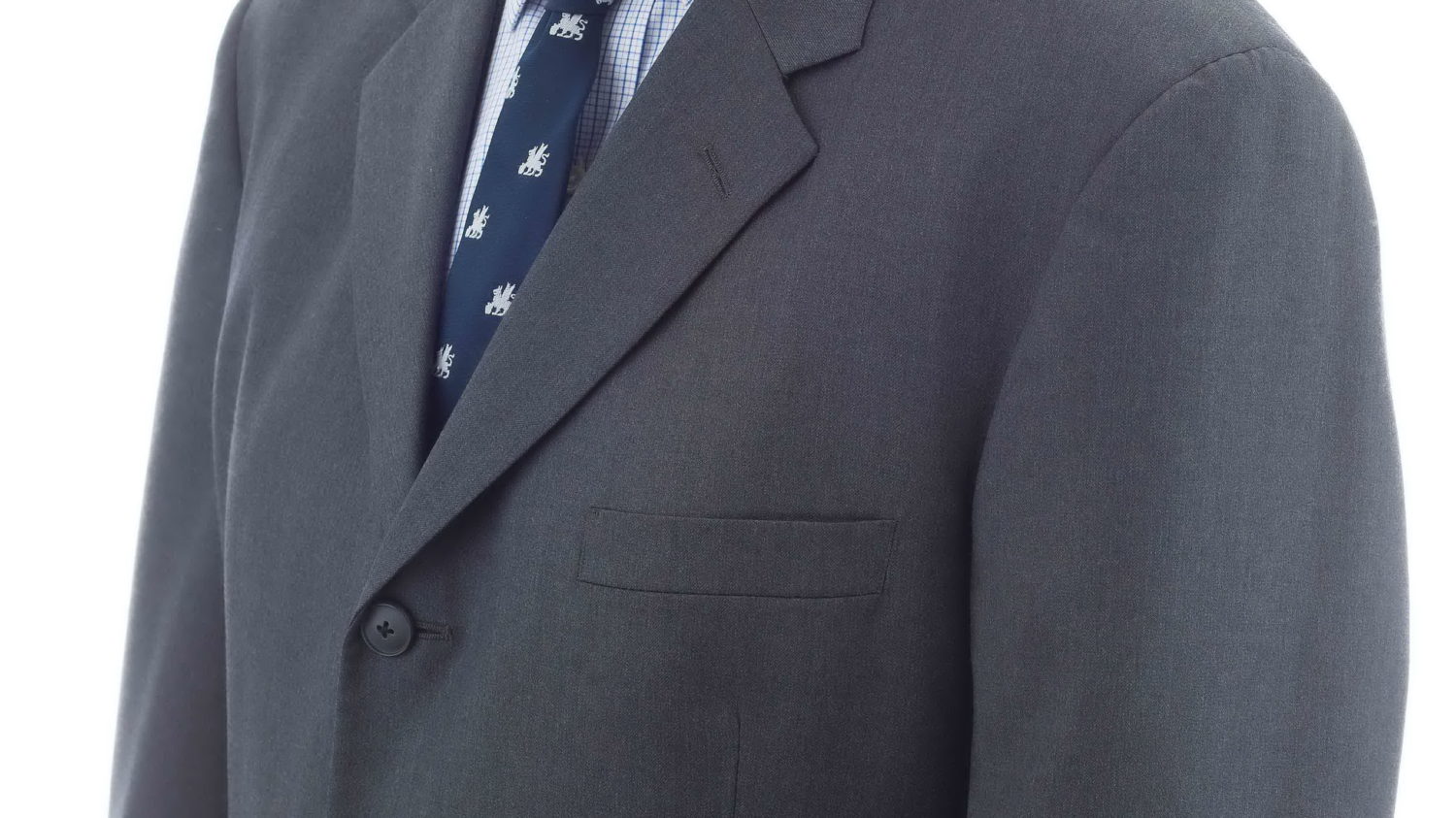
Cheap Suit without lapel roll
In Tip #2, we suggest that you know your needs and stick to buying from your list. However, if you want to end up with something worth owning, beware of buying cheap. Quality has its price, so dont let a cheap find turn you into a sucker. Even a piece that is marked down by 90% may be a total waste of money if it is not going to last beyond a couple years. Yes, it is nice to score a deal, but a smart budget shopper will also consider how quickly they will have to replace an important piece if they buy something cheap.
Budget Tip 9: Dont Be Tempted by Sales and Discounts
Buying something on sale might seem like an obvious solution to shopping on a budget, but the trouble is, very rarely are the things on sale that you really need.

50% Suit sale
If a deal is too good to be true, it probably is too good to be true. There is probably a reason why nobody has bought an item before you at a retail store if it is marked down heavily it may be a second, there could be a loose threads, tears or stains. Only take items you know you can repair with certainty buttons are easy to sew back on, but a stain is not worth the risk. Of course, deals come along, and the more you know, the more likely you will be to spot it. A friend of mine once bought a mislabeled bespoke jacket advertised as cashmere for 300 ; it was actually Vicuna, which he then sold for 3000 . However, these deals are very rare.
Instead, think about the cost per wear you will get out of the garment. And the $50 seersucker jacket can turn out to be more expensive than the $400 blazer in the long run. This also applies to cheap finds that need a lot of alterations dry cleaning and extensive tailoring can easily multiply the real cost of ownership quickly. It may be worth buying something a full price if youll get
Budget Tip 10: Dont Compromise on Fit
Most people today dont know what a good fit means. Obviously, it depends on your standards, but personally I have never seen anything off the rack that fit perfectly, yet I have met many people who claim they have. It is all in the eye of the beholder.
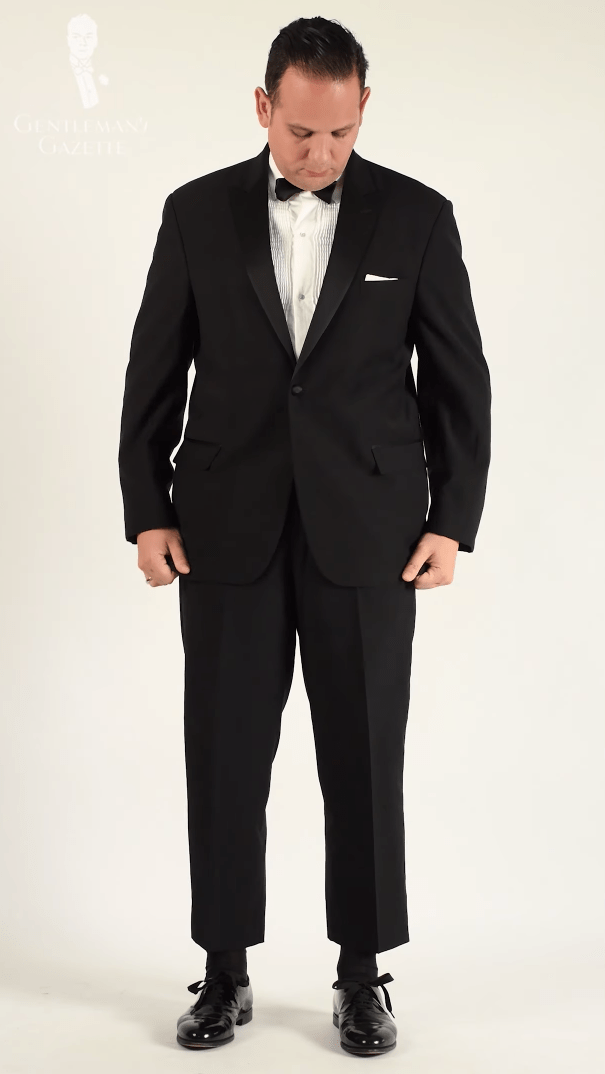
Mens Wearhouse Would you want to be seen wearing this ill-fitting rental tux?
Generally, wrinkles in a suit when you stand are a sign of a bad fit. Vertical creases or wrinkles indicate that the garment is too wide in certain parts. Horizontal X-folds indicate that something is too tight.
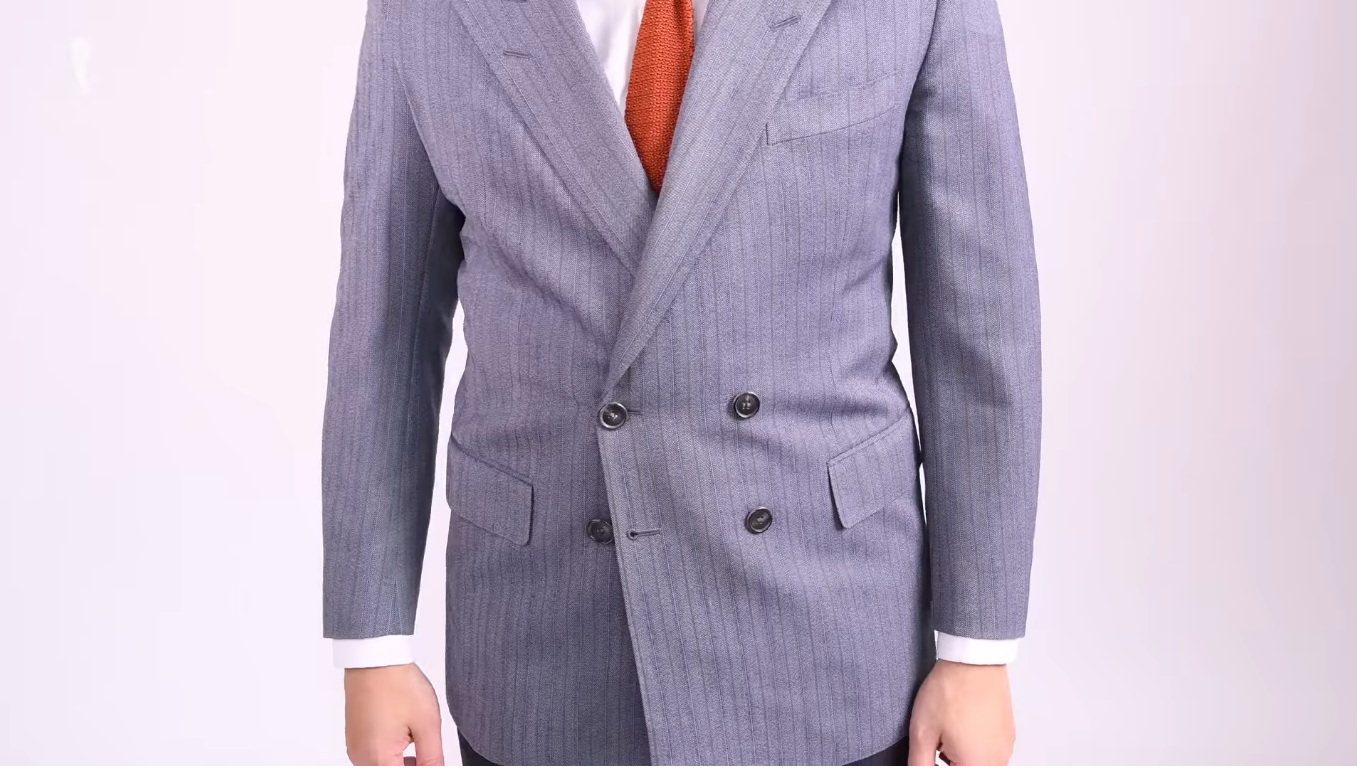
x wrinkles signify a too tight jacket
When in doubt, get something slightly larger than you need it to be, because most commercially produced garments do not have much of a cloth reserve built in to make tight garments looser. Handmade garments usually have more fabric in reserve. Check out our guides to pants fit and suit fit for more detail.
Budget Tip 11: Dont Trust a Salesperson or a Seller
A few years ago, an employee at a haberdasher tried to tell me a Dobbs hat he was selling was the best in the world. That statement was both very bold and very wrong. Now, I know much more about hat felts than the average person, but this situation illustrates a good point.
Most salespeople want to sell you as much stuff as possible, and thats it. Its rare to meet a salesperson who is both educated and willing to teach customers about clothing, what will work for you and what wont. Unfortunately, the days when men could make a career out of haberdashery are long gone, and most salespeople at retail stores are paid little more than minimum wage to stock shelves.
Salespeople have a conflict of interest and are no longer trained well enough to truly help sartorially-inclined men make good decisions. Go into stores with the intent of being your own best resource.
Budget Tip 12: Do Your Research Before Buying
If you want to spend carefully, it pays to educate yourself and go shopping prepared with your own resources.We hope we can be of service here at the Gentlemans Gazette; it has been our goal from our very first day to help men dress better and elevate their style by educating them. Our archive is chock full of guides to everything weve mentioned in this article. Here are 43 other online resources to consider. Check out my top 10 favorite fashion books and 100 Mens Fashion Books for additional style resources.
Budget Tip 13: Avoid Outlets
Originally, outlets were obscure shopping destinations that sold clothes stores couldnt sell in their regular stores. They were filled with slightly flawed, unusual, or single-item garments that didnt appeal to a mainstream audience, and they used discounts to move them off the shelves. Within the last 10 years, outlets have become more popular, and retailers understand that many people shop based on discounts.

Avoid Outlet Malls
As such, many brands have decided to play along and produce new items just for outlets. Of course, these are of lower quality with higher price tags so they can lure customers into a sale with 70% off signs. If you find something that is exactly what you want, thats fine. Otherwise, stay away because you will end up with stuff that you will quickly have to replace, and that doesnt just harm the environment but also your wallet.
Budget Tip 14: Stay in Touch
Once you have found a store with good quality merchandise, ensure that you are added to their customer database and sign up for their newsletter, so you can stay in touch. If you develop a relationship with the owner, they will often volunteer to inform you if something youre looking for comes in the store in your size.
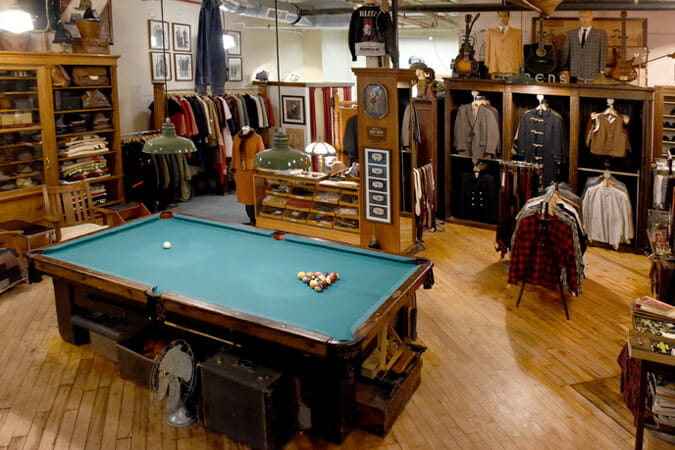
Bobby from Boston was a legendary vintage store
Follow your favorite eBay stores and vintage shops on Instagram, where many will post new finds. This technique works best with small local stores, and it will give you an edge if you are a preferred, engaged customer. The store owner may even help you look for something
Budget Tip 15: Stick to Your Budget
Create a clothing budget by saving a set amount every month. Even if it is just $20 a month, that might easily result in a new tie or jacket from a vintage store. Save up and then buy a quality item when you can afford it.

Budgeting will allow you to build a wardrobe without breaking the bank
You can increase your budget if you sell something. I always used this in-and-out mentality because clothes I didnt wear were tying up money in my closet. So, it is best to start with the things you have and dont wear. Either sell it on eBay or at a local vintage store (stores are usually easier). Personally, I always went vintage with my clothes and then bought exactly the accessories I wanted to complete my look because I could afford a pair of nice socks for $30 or a pocket square and tie for the full price, whereas a new garment would have been way too expensive.
Conclusion
Even, if cant afford things youd love to own at the moment or if you just dont have access to nice clothes very easily, there is always a way to dress stylishly on a budget. I think the tips I provided here should provide you with all the fundamentals you need so you can build your very own wardrobe on a budget.


